ACADEMY ACTIVITIES
New Leadership of INAE
Mr JD Patil, FNAE has taken over as President of INAE w.e.f. January 1, 2025 from Prof Indranil Manna, FNAE who was President of INAE from January 1, 2021 to Dec 31, 2024.
President of INAE
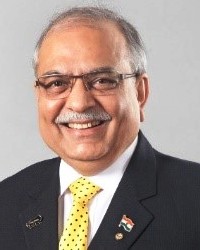 Mr. JD Patil
Mr. JD Patil
Member of Executive Committee of Management & Advisor (Precision Engineering & Semiconductor Technologies) to L&T CMD, Former Whole Time Director L&T; Member of the Board of IN-SPACe; Chairman Indian Space Association; and Founder Vice President & Past President Society of Indian Defence Manufacturers
Immediate Former President, INAE
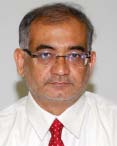 Prof Indranil Manna
Prof Indranil Manna
Vice Chancellor, Birla Institute of Technology (BIT), Mesra, Ranchi, Jharkhand [On lien from I.I.T. Kharagpur, W.B.] and Former Director, Indian Institute of Technology Kanpur, U.P.; Former Director, CSIR-Central Glass & Ceramic Research Institute (CGCRI), Kolkata.
For details regarding new composition of INAE Governing Council click on the link given below.
https://www.inae.in/about-us/committees/governing-council/
Academy News (Covering period from October 1, 2024 to January 31, 2025)
Joint activities with ANRF (erstwhile SERB), DST
I. ANRF (erstwhile SERB), DST-INAE Online and Digital Gaming Research Initiative
The ANRF (erstwhile SERB), DST-INAE Online and Digital Gaming Research Initiative was launched at the behest of DST as a unique program to leverage Digital Gaming Research and Industry in India and to achieve self-reliance in advanced Augmented Reality (AR)/ Virtual Reality (VR) technologies to create indigenous gaming platforms for several applications ranging from education to leisure with the backdrop of Indian Ethos, for desktop and hand-held devices. A Letter of Intent (LoI) for SERB – INAE Cooperation on SERB Digital Gaming Research Initiative was digitally signed during March 2022 between President, INAE and Secretary, SERB, for INAE to act as nodal agencies to partner and cooperate in the implementation of SERB-INAE Online and Digital Gaming Research Initiative. This initiative is in line with national priorities. The initiative launched to leverage Digital Gaming Research and promote such Industry in India is progressing well. The call for proposals were invited and the Program Management and Advisory Committee (PMAC) was constituted to evaluate, select, and review proposals received in response of the call for proposal. After rigorous selection process, a total of 12 proposals were approved by SERB during August 2023 in Category I: R&D in Learning, Educational, and Leisure Online Gaming Platforms and Category II: Immersive Game Prototypes, with a focus on Indian Culture & Values. Due to withdrawal of one of the projects, a total of 11 projects are currently being progressed. The funds had since been released and the projects were sanctioned. In order to regularly monitor the progress of these projects, it was decided by the PMAC to conduct a review meeting twice a year. In this context, two review meetings were held, one on March 12, 2024 and second on November 5, 2024, wherein project PIs presented their work progress before the PMAC. The next review meeting is planned to be held shortly.
II. INAE – ANRF (erstwhile SERB) Abdul Kalam Technology Innovation National Fellowship
The ANRF (erstwhile SERB), DST – INAE Abdul Kalam Technology Innovation National Fellowship launched in 2017 is a flagship initiative of INAE, funded by SERB (DST), to recognize, encourage and support translational research by individuals working in various capacities of engineering profession in public funded institutions in the country. Several of the translational research projects pursued by these Kalam Fellows have reached the stage of technology transfer and creation of start-ups including filing up of over 140 patents and technology transfers and around 430 publications. Patents and startups have been developed on various research proposals such as Laser-based technique to crystallize ferroelectric thin films at 300°C, Green/Sustainable IoT for Smart Environment, Next generation filtration devices for protection of environment and health, Tactile Diagrams for Visually Impaired, Automatic Assessment of Fluency in Spoken Language and a method thereof.
III. ANRF (erstwhile SERB), – INAE Collaborative Initiatives in Engineering:
(i) 18th National Frontiers of Engineering (NatFoE) & IMP 2024
The 18th Symposium on National Frontiers of Engineering (NatFoE), a flagship event organized by the Indian National Academy of Engineering (INAE) since 2006, aims to inspire young engineers (aged approximately 27-45) from industries, universities, and R&D labs to present cutting-edge research in various engineering fields. The 18th NatFoE-24 symposium was hosted by the Indian National Academy of Engineering (INAE) in collaboration with the National Institute of Technology Warangal, under the auspices of the ANRF (SERB) – INAE Conclave on Atmanirbhar Technologies for Engineering a Secured Future, held on November 15-16, 2024.
This annual event was attended by numerous young researchers from academic institutions, R&D laboratories, and industries. The symposium’s inaugural function took place at the Ambedkar Learning Centre at NIT Warangal, with notable dignitaries including Prof. Indranil Manna President, INAE, Prof. Sivaji Chakravorti, Vice President, INAE, Prof. Bidyadhar Subudhi, Director, NIT Warangal, and Prof. Shirish H Sonawane, Dean of Research and Development, NIT Warangal gracing the occasion.
In line with the country’s mission on Atmanirbhar Technologies under four themes were decided for the symposium as mentioned below:
- Additive Manufacturing and Automation
- Smart Grid: Power Electronic Converters, Control and Protection
- Green Hydrogen and Storage Technologies
- Quantum Computing, Artificial Intelligence, and Machine Learning
Based on the aforesaid themes, four sessions were conducted as follows:
Session 1: Additive Manufacturing and Automation
Coordinators: Prof. Adepu Kumar, Prof. Ravi Kumar and Prof. Shivraman
| Plenary Talk: Human-Centric Manufacturing and Industry 5.0 |
Prof. S K Pal highlighted the transformative potential of Artificial Intelligence (AI) and automation in manufacturing, with a focus on Industry 5.0’s human-centric approach. Unlike Industry 4.0, which emphasizes digitization and automation, Industry 5.0 fosters collaboration between humans and intelligent machines, ensuring that human creativity, problem-solving, and emotional intelligence remain central to the process.AI and automation optimize manufacturing by improving efficiency, enhancing quality, reducing costs, and driving innovation. AI handles repetitive tasks, allowing humans to focus on more complex, creative work. However, the human element remains crucial for addressing challenges that require emotional intelligence and judgment. Prof. Pal also stressed the importance of sustainability in manufacturing, advocating for the integration of green technologies, alternative energy, and scalable automation. This approach can help small-scale industries reduce costs, enhance energy efficiency, and contribute to a greener future.
Cybersecurity risks related to AI and automation were another concern. As industries become more interconnected, robust cybersecurity measures are essential to protect data and operational safety. Looking to the future, Prof. Pal discussed the potential of 6G networks and the Internet of Things (IoT) in enabling real-time communication and self-optimizing factories. Tactile IoT systems will enhance precision and safety, making manufacturing smarter, more efficient, and safer.
| Dr. Gururaj T (ARCI): Additive Manufacturing by Laser Powder Bed Fusion |
Dr. Gururaj discussed key advancements in material development for Additive Manufacturing (AM) using Laser Powder Bed Fusion (L-PBF) technology. He emphasized the importance of alloy chemistry modification to optimize material properties for efficient 3D printing and the role of spherical powders in improving flowability and consistency, which enhances print quality and reduces defects.
He also highlighted the integration of conformal cooling channels in AM, which improve heat dissipation and extend the lifespan of manufacturing dies. Additionally, Dr. Gururaj stressed the benefits of topology optimization for designing lightweight structures, reducing material usage while maintaining structural integrity. Looking to the future, he outlined the development of new alloy powders, including non-weldable materials, and the potential of Artificial Intelligence (AI) and Machine Learning (ML) to optimize AM process parameters in real-time, enhancing precision and efficiency. He also emphasized improving powder flowability by refining powder sphericity and eliminating satellite particles to ensure consistent and reliable printing.
In conclusion, Dr. Gururaj’s insights pointed to a future where advancements in materials, AI-driven optimization, and refined powder characteristics will revolutionize Additive Manufacturing, benefiting industries like aerospace, automotive, and healthcare.
| Mr. Ankith Sahu, (Objectify Technologies Pvt Ltd): Qualification and Standards in Additive Manufacturing (AM), especially for aerospace and aviation applications |
Mr. Ankit Sahu highlighted the critical role of process and material qualification in metal Additive Manufacturing (AM), especially for aerospace and aviation applications. He discussed strategies for design planning, ensuring regulatory compliance, and adhering to industry standards such as AWS D20, with a focus on dimensional tolerances, acceptance criteria, and Non-Destructive Testing (NDT) qualifications.
Mr. Sahu emphasized the importance of integrating online defect monitoring during the Laser Powder Bed Fusion (L-PBF) deposition process and process validation to enhance reliability and maintain high-quality manufacturing standards. He also outlined future efforts to advance regulatory compliance, improve defect detection methods, and refine manufacturing practices, all aimed at supporting the development of advanced components for aerospace and unmanned aerial vehicles.
| Prof. Poonam Sundriyal (IIT KGP): 3D Printing for Energy Devices |
Prof. Poonam Sundriyal explored the innovative application of 3D printing technology in the development of flexible, wearable supercapacitors integrated with energy-harvesting components. These supercapacitors are designed to efficiently store and deliver energy while being able to withstand mechanical stress, making them ideal for wearable electronics. The integration of energy-harvesting components enables these supercapacitors to generate power from external sources such as motion or environmental factors, providing a sustainable and self-sufficient energy solution. Prof. Sundriyal highlighted the promising performance of these devices in real-world conditions, where flexibility and durability are critical, especially in applications involving continuous wear or movement.
Looking to the future, Prof. Sundriyal emphasized the importance of advancing the technology behind cell-powered electronics. By incorporating higher-energy harvesting components and enhancing the durability of the supercapacitors, these devices can become more robust, capable of functioning reliably even under continuous deformation. This innovation will be crucial for the development of practical, sustainable, and energy-efficient solutions for a wide range of applications, from wearable health monitoring systems to flexible electronics in various industries. Prof. Sundriyal’s research aims to not only push the boundaries of energy storage technology but also contribute to the creation of more environmentally friendly, self-powered devices that can meet the growing demand for efficient and sustainable electronic solutions.
Session 2: Smart Grid: Power Electronic Converters, Control and Protection
Coordinators: Prof. Ram Krishan and Prof. V. T. Somasekhar
The plenary session titled “Smart Electric Grids: Power Management, Control, and Protection Challenges” under theme 2 was presented by Prof. S. C. Srivastava from IIT Kanpur, a pioneer in power system advancements. Prof. Srivastava provided an enlightening overview of the history of smart grids and detailed the microgrid system, highlighting cutting-edge technologies for power management. Elucidating the operational challenges encountered while operating the microgrid initiated by IIT Kanpur, he presented a real-time case study on renewable energy–integrated microgrid operations. Furthermore, during the interactive session, he explained the concept of net-zero emissions and the progress made in this cutting-edge research area. He opined that smart grids with extensive renewable energy integration pave the way to the herculean task of meeting the ever-growing electricity demand in the future.
As part of the smart grid theme, three invited lectures were delivered by young researchers from IIT Delhi, IIT Kharagpur, and IIT Bhubaneswar. Dr. Yashasvi Bansal, Assistant Professor in the Department of Electrical Engineering at IIT Delhi, gave an insightful presentation on the “Transformative Role of PMUs for Monitoring and Protection in Smart Grids.” She highlighted the crucial role of Phasor Measurement Units (PMUs) in real-time monitoring, protection, and control of smart grid systems, emphasizing their effectiveness in enhancing the reliability and stability of power grids.
The next lecture was presented by Dr. P. Deepak Reddy, Assistant Professor at IIT Kharagpur, who focused on the “Operation and Control of Microgrid Systems.” He shared his cutting-edge research on microgrid systems, discussing the various operational modes and control strategies that ensure efficient and reliable integration of renewable energy sources. In the final session, Dr. Chandrashekhar Perumalla from IIT Bhubaneswar provided valuable insights into wireless power transfer and the challenges involved in electric vehicle (EV) charging. He emphasized the importance of developing robust EV charging infrastructure to support India’s ambitious net-zero emission targets, underscoring the critical role of innovative technologies in achieving a sustainable future.
Key Takeaways:
- Integration of Renewables: Transitioning to smart grids with renewable energy is inevitable for a sustainable future but requires innovative management strategies and new technologies.
- Real-Time Monitoring: PMUs and other real-time monitoring devices are essential to maintain grid stability and manage complex, dynamic systems.
- Microgrid Flexibility: Microgrids provide modular, adaptable solutions for modern grids, but require complex control strategies for seamless integration.
- Investment in EV Infrastructure: Scaling up EV charging infrastructure which includes wireless charging, is the key to evolving sustainable solutions in the arena of transportation.
These sessions collectively emphasized that the future of smart grids relies on technological innovation, renewable integration, infrastructure development, and effective administration to meet environmental and energy objectives.
Session 3: Green Hydrogen and Storage Technologies
Coordinators: Prof. P. V. Suresh and Prof. K. Manohar
The second day of NatFoE 2024, held on 17th November 2024, featured an engaging session on Green Hydrogen and Storage Technologies. The theme conveners extended a warm welcome to the speakers, guests, participants, and students, setting the stage for an important discussion at the intersection of innovation, sustainability, and national progress.
As the world faces the dual challenges of climate change and energy security, green hydrogen stands out as a promising solution. It is a clean, versatile energy carrier with the potential to revolutionize industries, transportation, and power generation. Simultaneously, advancements in energy storage technologies are essential for unlocking the full potential of renewable energy, ensuring stability, reliability, and scalability. Together, green hydrogen and storage technologies form the foundation of a sustainable energy future, both globally and in India.
The session began with a plenary lecture by Prof. S. Basu from IIT Delhi, a leading expert in electrochemical systems. His insightful talk, titled Electrochemical Engines for Energy Storage and Conversion to Achieve Net Zero Carbon Emission, provided a thorough overview of hydrogen’s transformative potential as an energy carrier. Prof. Basu emphasized the critical advancements needed to make hydrogen and fuel cell technologies both sustainable and economically viable. He also highlighted the development of a membrane-less alkaline micro-electrolyser, a promising innovation that could significantly improve the efficiency and cost-effectiveness of hydrogen production.
This was followed by three invited lectures that further enriched the discussion:
- Vijay Radhakrishnan from Reliance India Limited, Mumbai, delivered an insightful overview of Sodium-ion batteries as a sustainable alternative to Lithium-ion batteries. He elaborated on the engineering challenges and commercialization pathways essential for advancing this technology.
- Sujit Pillai from MNRE presented updates on government policies supporting the green hydrogen mission. His talk on the Indian National Green Hydrogen Mission and advancements in electrolyzer technologies (PEM, AEM, SOEC, and alkaline electrolyzers) provided a roadmap for scaling up green hydrogen production in India.
- Sreedevi Varam from NIT Warangal shared cutting-edge research on on-demand hydrogen generation using novel aluminum composite materials. She explored aluminum’s exceptional energy density and the role of metal activators and additives in addressing challenges in hydrogen storage and transportation, showcasing its transformative potential for clean energy systems.
These talks offered a comprehensive overview of the latest advancements, challenges, and opportunities in green hydrogen and storage technologies. Each lecture was followed by engaging audience interactions, with insightful questions and constructive suggestions that enriched the collaborative spirit of the session. The session concluded with heartfelt gratitude to INAE for providing this invaluable platform to exchange ideas, inspire innovation, and foster collaborations that will drive progress toward our net-zero aspirations.
Session 4: Quantum Computing and AI ML
Coordinators: Prof. P. Radhakrishna, Prof. Manish Kumar Bajpai and Prof. U. Venkanna
Five talks on state-of-the-art technologies were organized as a part of second day of NaTFoE 2024. The main frontiers of each talk are listed below:
- Quantum Technologies in the National Quantum Mission: The National Quantum Mission (NQM) has created four technology verticals in quantum computing, communication, sensing and metrology, and materials and devices. These four verticals aim to translate quantum science into applicable technologies that benefit Indian industry and society. The main challenges discussed were Scaling Quantum Systems, efficient Quantum Algorithms, Quantum Materials and Hardware, Quantum Networking and Communication, Error Mitigation and Noise Management, and Standardization and Accessibility.
- Importance of Remote Photoplethysmography in AI: Remote photoplethysmography (rPPG) is a contactless technology that estimates physiological parameters such as heart rate, respiratory rate, and blood oxygen saturation using video-based analysis. Coupled with AI, rPPG has become a transformative tool across various domains, emphasizing its significance in modern healthcare, wellness, and beyond. The critical points discussed are AI integration with contactless health monitoring, development of AI algorithms for robust signal interpretation, leveraging federated learning for privacy-preserving data analysis, and Integration of rPPG into interoperable AI-powered health systems.
- Quantum Simulators and Accelerators: Harnessing PARAM for Quantum Computing Acceleration: Quantum simulators and accelerators are crucial in advancing quantum computing, offering the capability to model quantum systems and execute quantum algorithms faster. PARAM, India’s Indigenous supercomputing series, plays a vital role in fostering the development of quantum computing acceleration. By integrating quantum simulators and accelerators into its architecture, PARAM can lead India’s efforts in quantum research, supporting applications in science, engineering, and beyond. This synergy positions PARAM as a cornerstone in the quantum computing revolution.
- Symbiotic Relationship Between Artificial Intelligence and Computing Systems Design: There is a symbiotic relationship between artificial intelligence, primarily machine learning and deep learning, and computing systems design, emphasizing how they have come to influence the progress of each other. Traditionally, we believe in providing more computing power to the ever-increasing complex ML/DL models. The symbiotic relationship between AI and computing systems design reshapes the technological landscape. This interplay drives innovation in AI applications and enhances computing platforms, paving the way for more intelligent, efficient, and sustainable systems. By harnessing this synergy, industries can address emerging challenges in energy, scalability, and real-world AI deployment.
- AI Infrastructure: Optimizing LLM Inference for Efficiency and Scalability: Large Language Models (LLMs) are revolutionizing AI applications with their unprecedented language understanding and generation capabilities. However, training and deploying these models at scale can be computationally expensive and resource-intensive. To unlock the full potential of LLMs, it is crucial to optimize their inference process. Optimizing LLM inference for efficiency and scalability is at the frontier of AI infrastructure development. Through innovations in model compression, hardware acceleration, memory optimization, and scalable frameworks, the field is moving toward sustainable, real-time, and accessible LLM deployment. These advancements enable broader adoption of LLMs and ensure their role in shaping transformative applications across industries.
Around 70 faculty and researchers from various engineering institutions participated in the two-day program. 28 posters were presented during the event and in addition a National Level Competition, Innovations in manufacturing practices was dovetailed with the 18th National Frontiers of Engineering (NatFoE-24) Symposium on the second day where students across India presented their innovative ideas.
Innovation in Manufacturing Practices 2024
The Innovation in Manufacturing Practices (IMP) – 2024, organized by INAE in collaboration with the National Institute of Technology Warangal under the aegis of the ANRF (SERB) – INAE Conclave on Atmanirbhar Technologies- Engineering Secured Future, took place on November 16, 2024. This event brought together a diverse group of participants, including undergraduate and postgraduate (Master’s students) as well as start-ups, all presenting innovative ideas and projects related to advancements in the manufacturing sector.
A total of 24 teams participated, pitching their cutting-edge ideas and demonstrating how they could revolutionize manufacturing processes. The event highlighted a broad spectrum of topics, from new manufacturing techniques to sustainability innovations, all aimed at driving progress within the industry.
At the conclusion of the event, cash awards were presented by eminent guests in three distinct categories, recognizing the most outstanding projects. In addition, certificates were distributed to the best poster presentations across four themes, further encouraging participants to engage in deep research and innovative thinking. The event not only provided valuable exposure to the participants but also fostered collaborations, ideas exchange, and inspiration, contributing to the larger goal of fostering an Atmanirbhar (self-reliant) manufacturing ecosystem in India.
Highlights:
- Over 28 posters were presented at the symposium, each reviewed by Prof. Sivaji Chakravorti, Prof. Subudhi, and an evaluation committee for each theme. Best poster certificates were awarded to the top presentations.
- The event featured 18 plenary and keynote talks, with a focus on diversity in the topics covered.
- A total of 67 participants from across the country attended the two-day symposium, with 64 participants from IMP presenting their ideas.
- 24 innovative ideas were pitched in the IMP session, out of the 67 submitted.
- Prof. Manna and Prof. Sivaji Chakravorti engaged with the IMP participants, offering valuable insights and feedback while also reviewing the prototypes.
- An MoU was signed between NIT Warangal and Agastya Hydrogen, marking a significant step in advancing collaboration in hydrogen technologies.
Participants, especially students, expressed that the symposium provided an excellent learning opportunity. They were highly motivated and inspired by the posters and exhibits showcased during IMP, which fuelled their enthusiasm for innovation and research in the manufacturing sector.
Pictorial Delight of NatFoE-2024 and IMP-2024
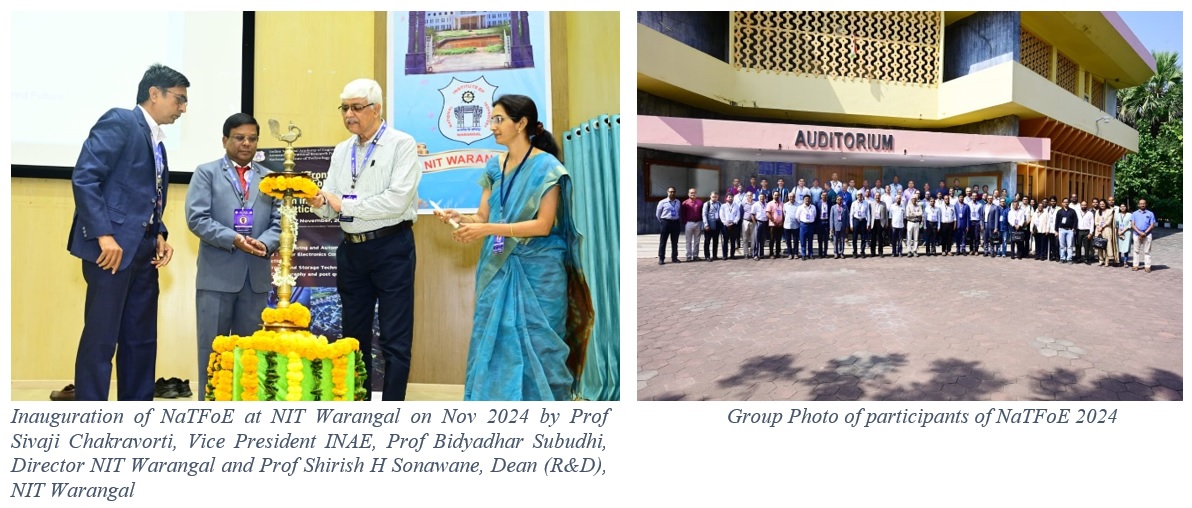
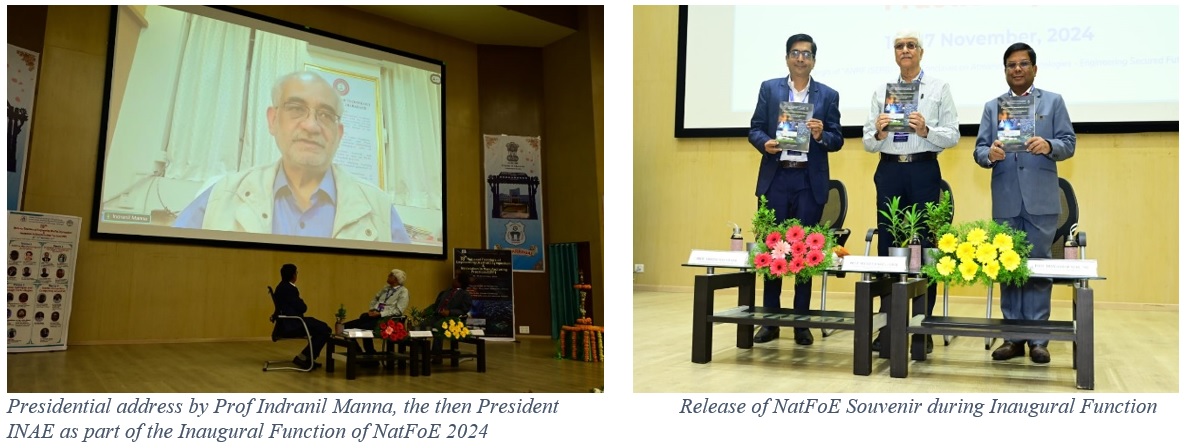
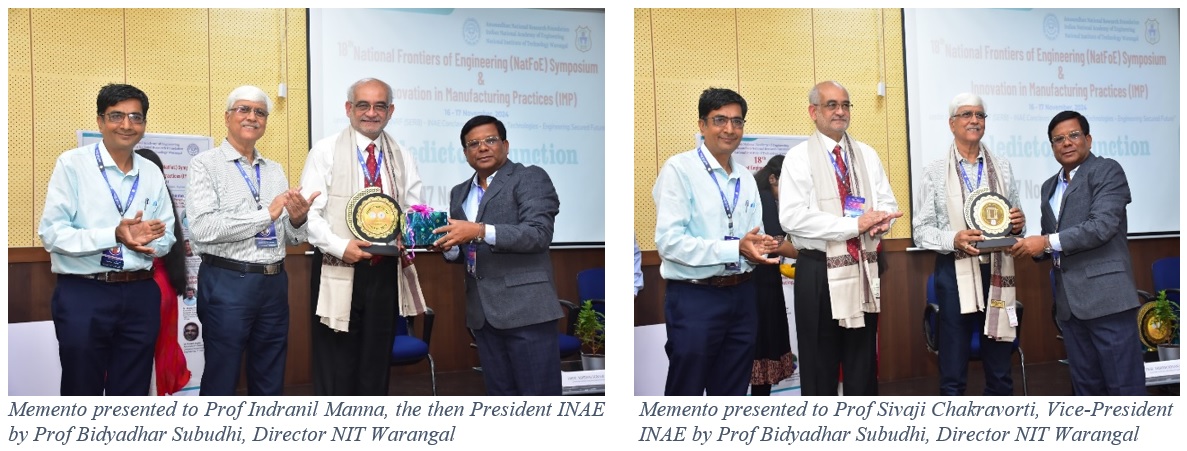
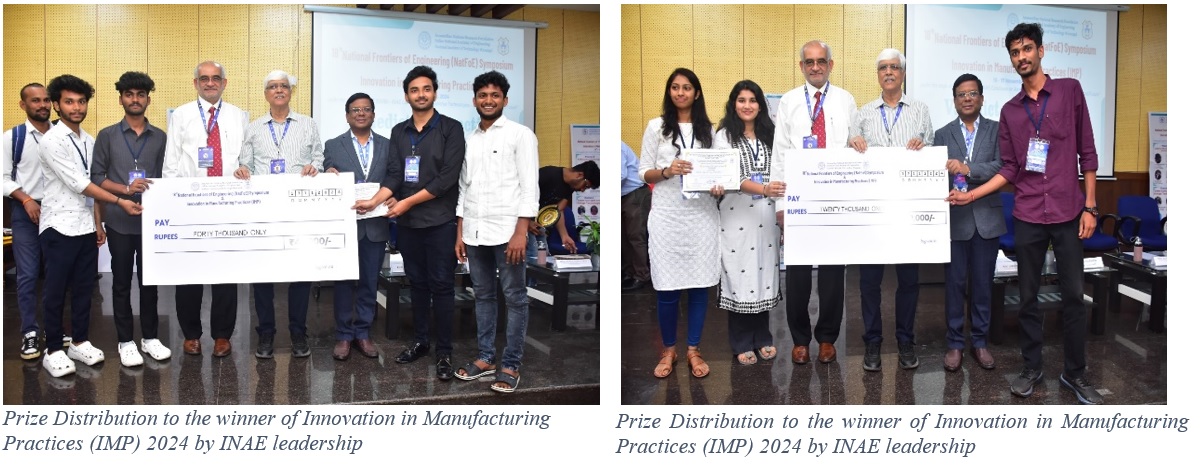
(ii) INAE Youth Conclave-2024 under the aegis of “ANRF (SERB)-INAE Innovation Hackathon”, December 12-13, 2024, IIT Bhilai
The Youth Conclave 2024 was organized at the Indian Institute of Technology Bhilai from December 12-13, 2024 under the aegis of “ANRF (SERB)-INAE Innovation Hackathon”. For this year’s Youth Conclave 2024 at IIT Bhilai, the theme was selected as AgriTech, HealthTech, FinTech, and Sustainable Technologies. The objective was to provide a platform to Bachelor/Master’s and Doctoral Level youth to express their technological creativity in these thematic areas. The conclave themes were chosen to promote engineering excellence, innovation, and youth leadership.
The Youth Conclave 2024 was inaugurated in the esteemed presence of Prof. N V Ramana Rao (Director, NIT Raipur), Prof. Sivaji Chakravorti (Vice President, INAE), Prof. Rajiv Prakash (Director, IIT Bhilai), and Dr. Nagesh D. Patil (Coordinator, Youth Conclave 2024, Associate Professor, IIT Bhilai). During the Inauguration ceremony (via online mode), Prof. Indranil Manna (the then President, INAE) delivered a magnificent presidential address. Further, Prof. Rajiv Prakash encouraged the participating students to come-up with new ideas that will be helpful for solving real-life problems in an amicable way. Prof. Sivaji Chakravorti shared his experience from industry and academia and discussed about frugal innovation. Prof. N V Ramana Rao expressed the significance of Innovation in Agritech, Healthtech, Fintech, and Sustainable technologies.
The conclave featured keynote lectures delivered by accomplished experts in their respective fields, who shared their insightful experiences and motivated the students for innovation and entrepreneurship. Some of the notable speakers included:
- Prof N V Ramana Rao, Director, NIT Raipur (Title of talk: Innovation in Agritech, Healthtech, fintech and sustainable technologies)
- Prof. Sivaji Chakravorti, Vice President, INAE (Title of talk: The backbone of sustainable human capital)
- Prof. P. Chakrabarti, Former Director, IIEST Shibpur & NIT-Allahabad, and Former Professor, IIT BHU, Varanasi (Title of talk: Impact of Disruptive Innovations on Industries)
- Mr. Prashant Mathur, CEO, Innovation and Technology Foundation (IBITF), NM-ICPS – DST (Title of talk: Innovations and entrepreneurship)
Other than keynote lectures, the conclave featured a series of engaging events such as several Oral Presentations, Poster Presentations, and Innovation Hackathon Presentations by participating students.
The Youth Conclave 2024 received an overwhelming response from the engineering students of various universities and engineering colleges in and around Chhattisgarh state. The total participation of almost 220 engineering students was evident during Conclave 2024, where they presented and discussed their ideas on themes related to AgriTech, HealthTech, FinTech, and Sustainable Technologies. During the program, all the participants were given opportunity to present their vision through oral and poster presentations. These intuitive minds also got opportunity to participate in Innovation Hackathon for showcasing their skills and honing them further. For encouraging these students, IIT Bhilai conclave technical committee rigorously evaluated their ideas and suggested them with future scopes.
The Youth Conclave 2024 came to an end with the valedictory session. During valedictory session, Prof. P. Chakrabarti and Prof. Rajiv Prakash emphasized the need for innovation in engineering and technology for betterment of society and country at large. The participants were presented the participation certificates and also the winners for oral, poster, and hackathon presentation were felicitated. The end of valedictory session marked the successful beginning for igniting the spark for innovation and scope of new technologies among these Young Participants from different parts of India.
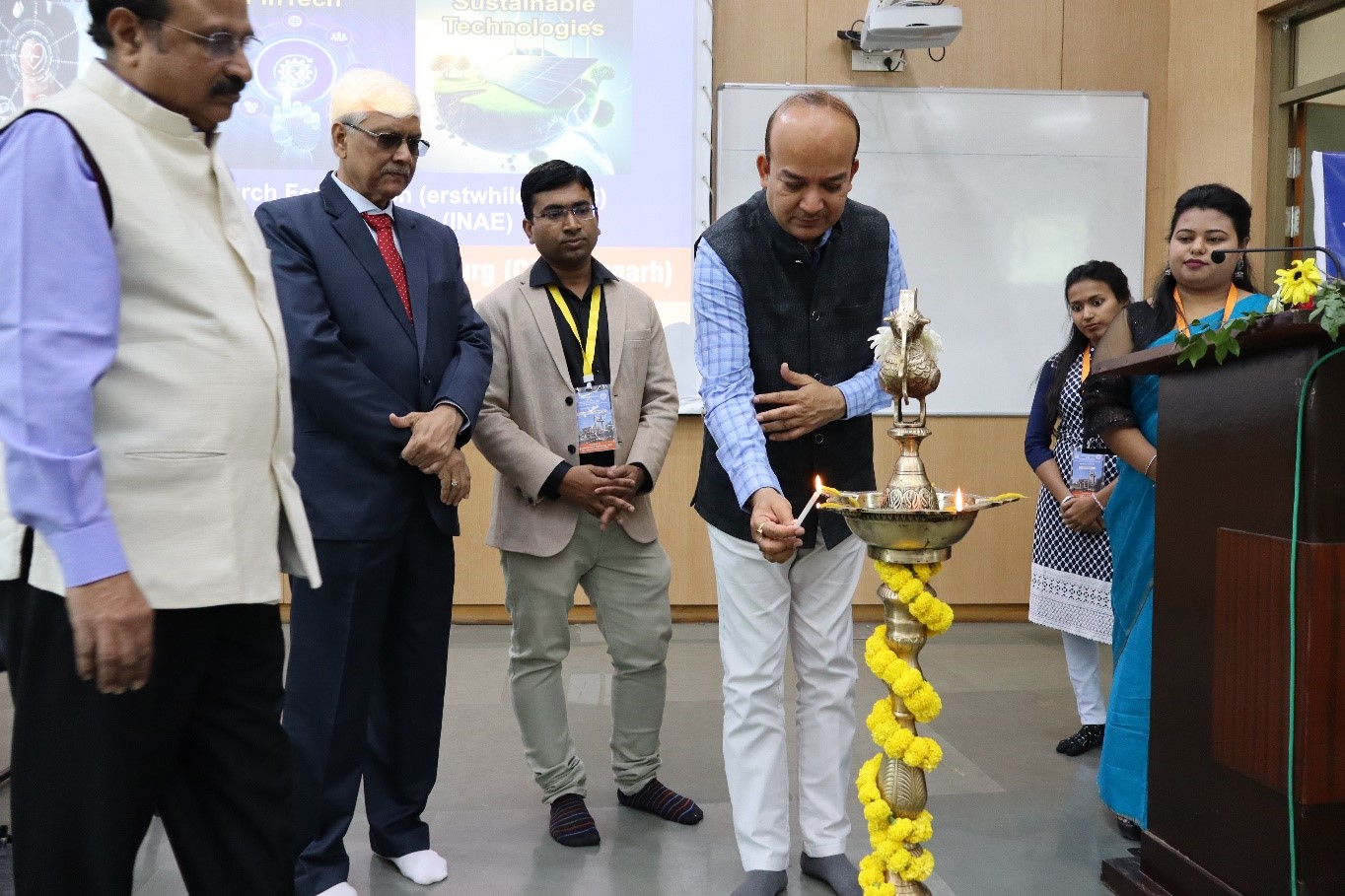 The dignitaries are lighting the lamp during the inaugural ceremony on Dec 12, 2024
The dignitaries are lighting the lamp during the inaugural ceremony on Dec 12, 2024
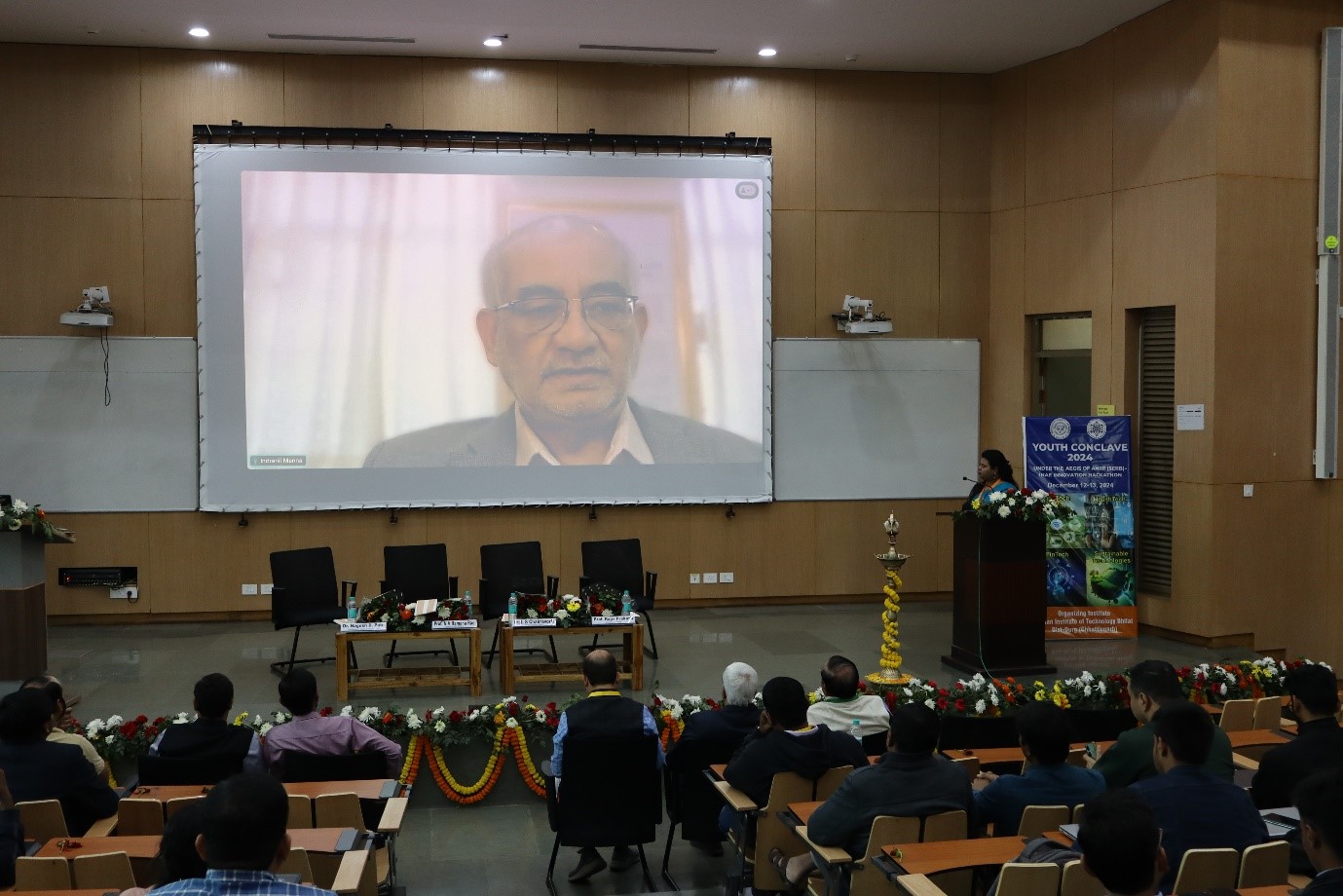 Prof Indranil Manna, President, INAE delivering his Presidential Address during Inaugural function
Prof Indranil Manna, President, INAE delivering his Presidential Address during Inaugural function
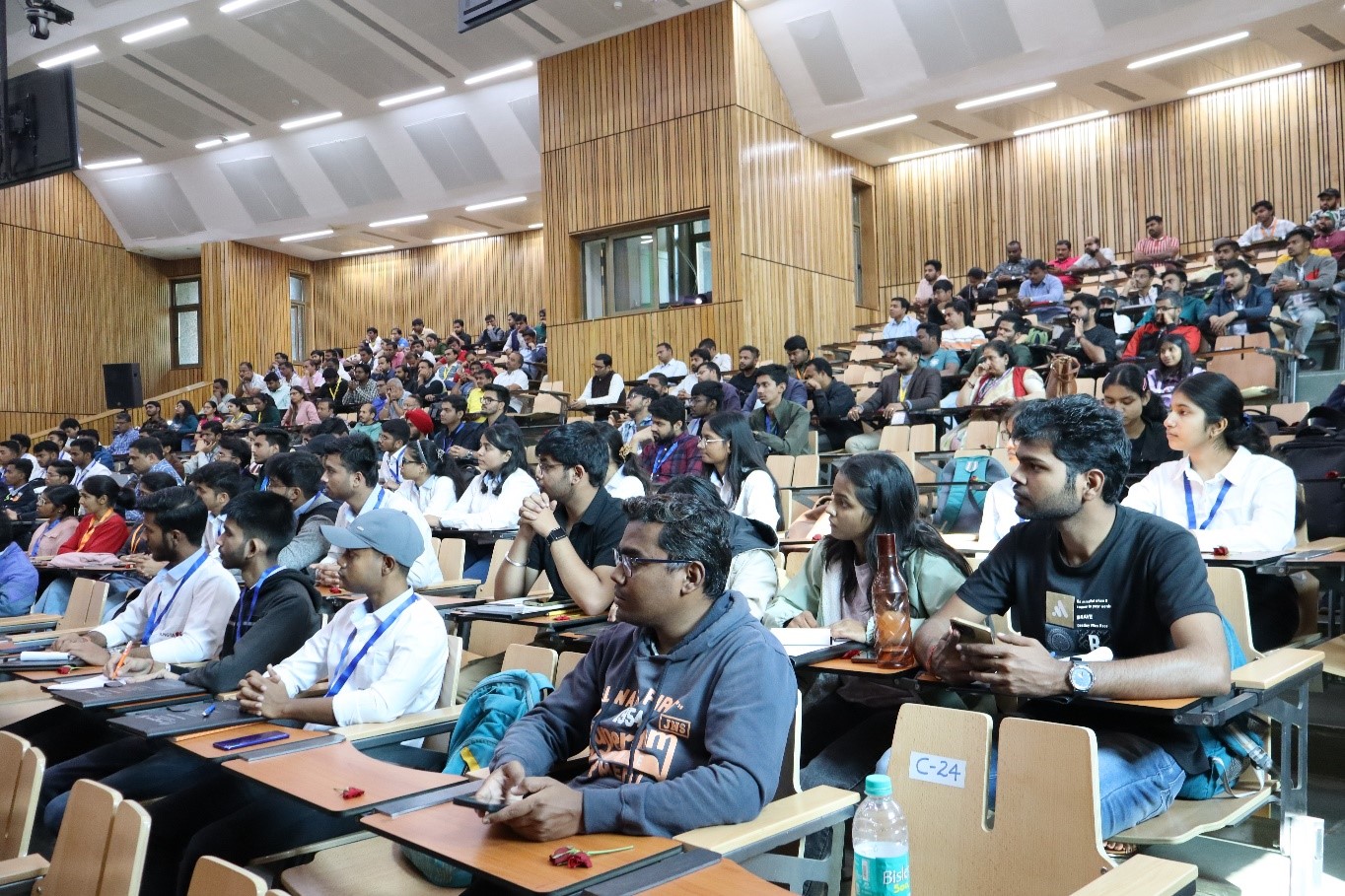 Participating Students attending the keynote address
Participating Students attending the keynote address
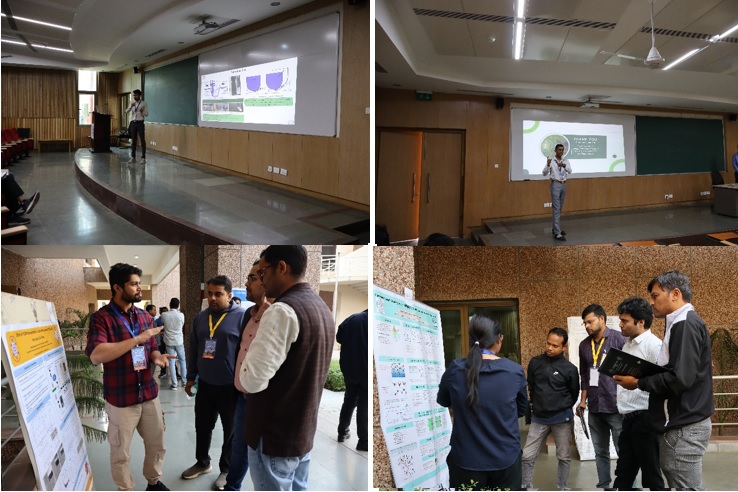 Some Photos of Participating Students presenting Oral and Poster Presentations
Some Photos of Participating Students presenting Oral and Poster Presentations
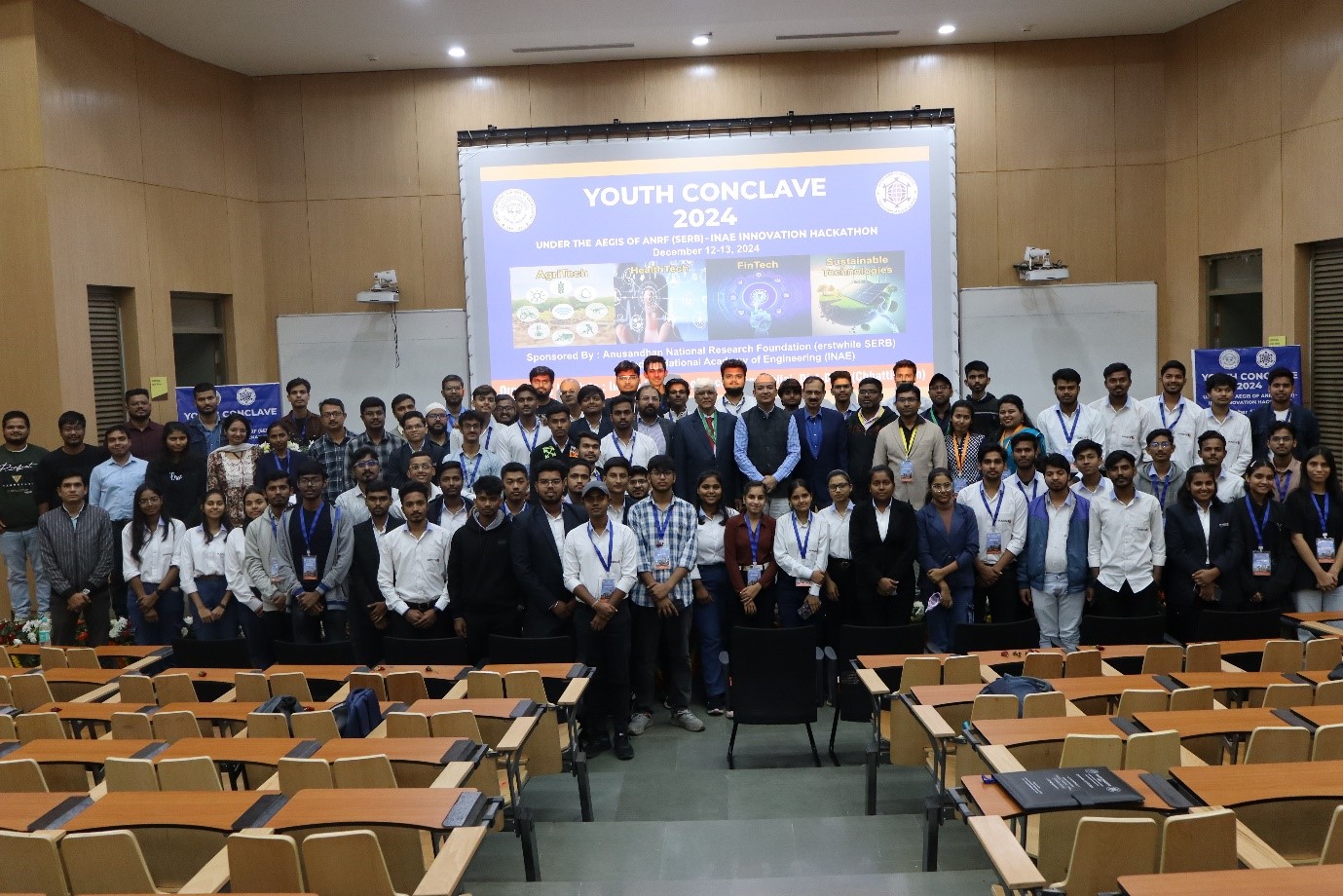 Group Photograph after the Keynote Lecture of Prof. Sivaji Chakravorti, Vice-President, INAE
Group Photograph after the Keynote Lecture of Prof. Sivaji Chakravorti, Vice-President, INAE
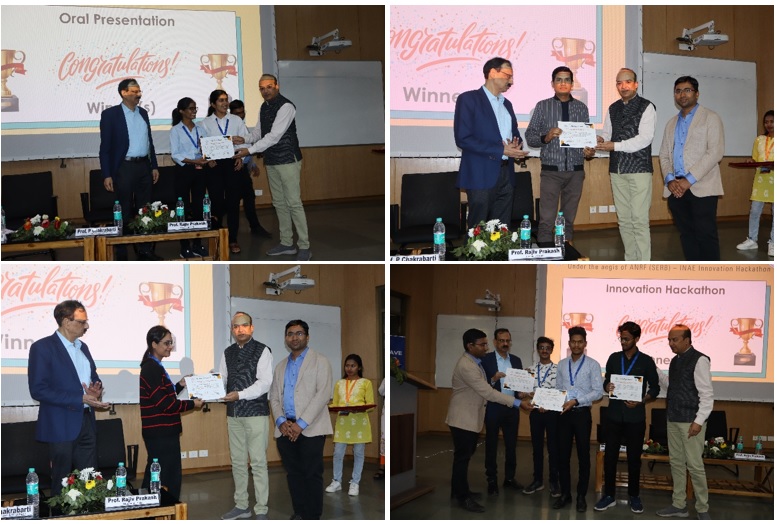 Some Photographs during the Felicitation of Winners of Oral, Poster, and Hackathon Presentations
Some Photographs during the Felicitation of Winners of Oral, Poster, and Hackathon Presentations
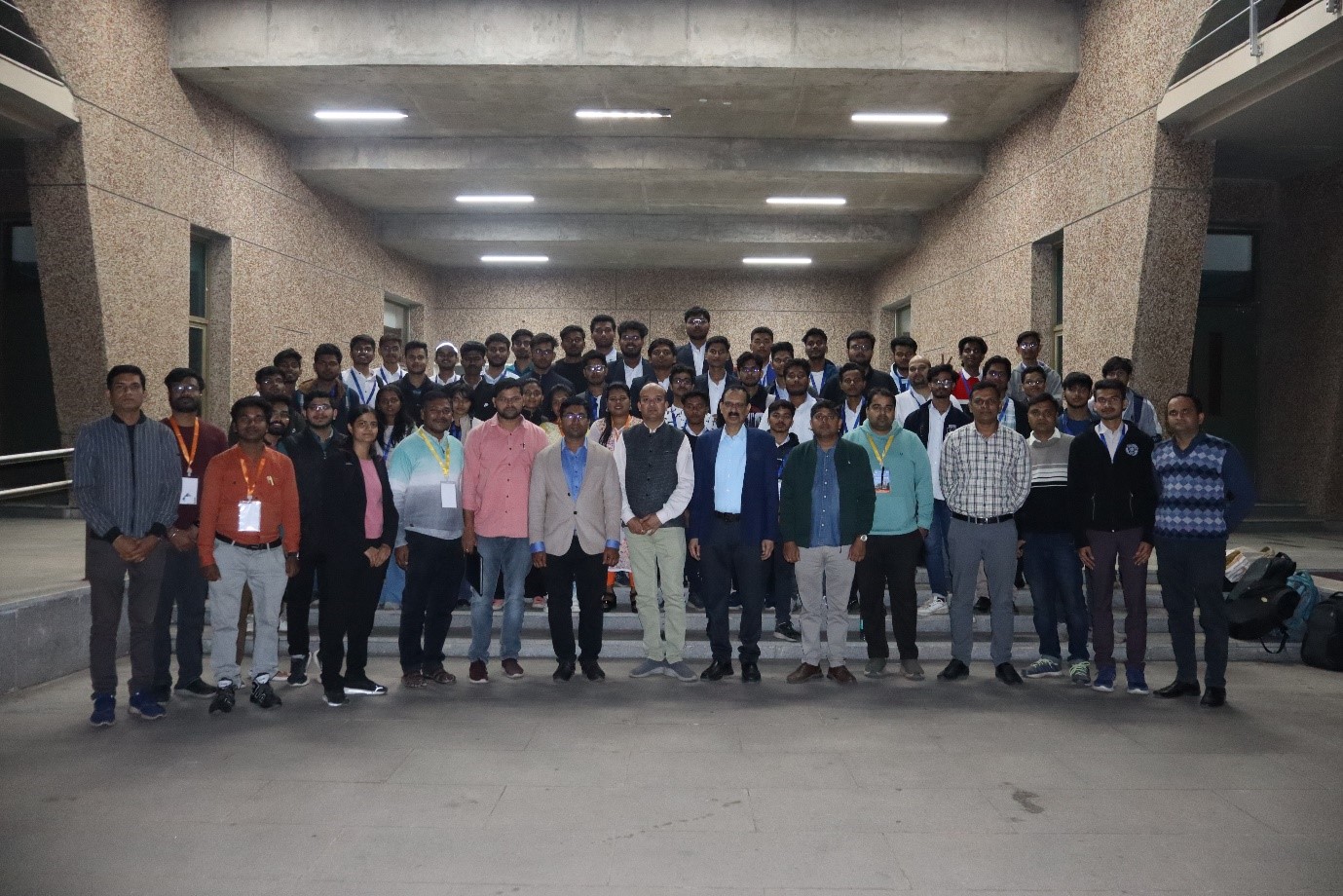 Group Photograph after the Valedictory Function in evening on Dec 13, 2024
Group Photograph after the Valedictory Function in evening on Dec 13, 2024
(iii) Poster Session organized under the aegis of “SERB (ANRF)-INAE Conclaves on Atmanirbhar Technologies – Engineering Secured Future” at IIT Delhi
A Poster Session and competition was held under the aegis of “SERB (ANRF)-INAE Conclaves on Atmanirbhar Technologies – Engineering Secured Future” for Masters’ Students and PhD Scholars of IIT Delhi on Dec 19-20, 2024 on the sidelines of the INAE Annual Convention 2024. This was a golden opportunity for them to showcase their research contributions in ten broad engineering disciplines. The Posters were judged by a panel of expert jury members from INAE Fellowship and Faculty of IIT Delhi who also interacted with the students and asked pertinent questions. The prize distribution of the Poster Session and competition, was held on Dec 20, 2024. The students appreciated the Poster Competition and also appreciated the lectures on both days and gained insightful knowledge through the conduct of the Poster Session and participation in the convention.
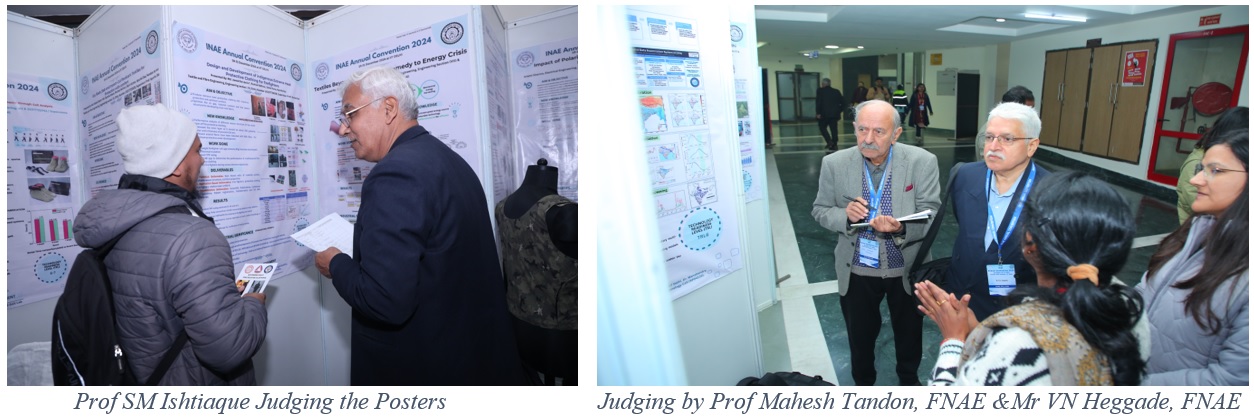


 Prof Sivaji Chakravorti, Vice-President, INAE (Extreme left) and Prof. Naresh Bhatnagar, FNAE, Dean (R & D), IIT Delhi (Extreme Right) presenting Prizes to the Winners of the Poster Session
Prof Sivaji Chakravorti, Vice-President, INAE (Extreme left) and Prof. Naresh Bhatnagar, FNAE, Dean (R & D), IIT Delhi (Extreme Right) presenting Prizes to the Winners of the Poster Session
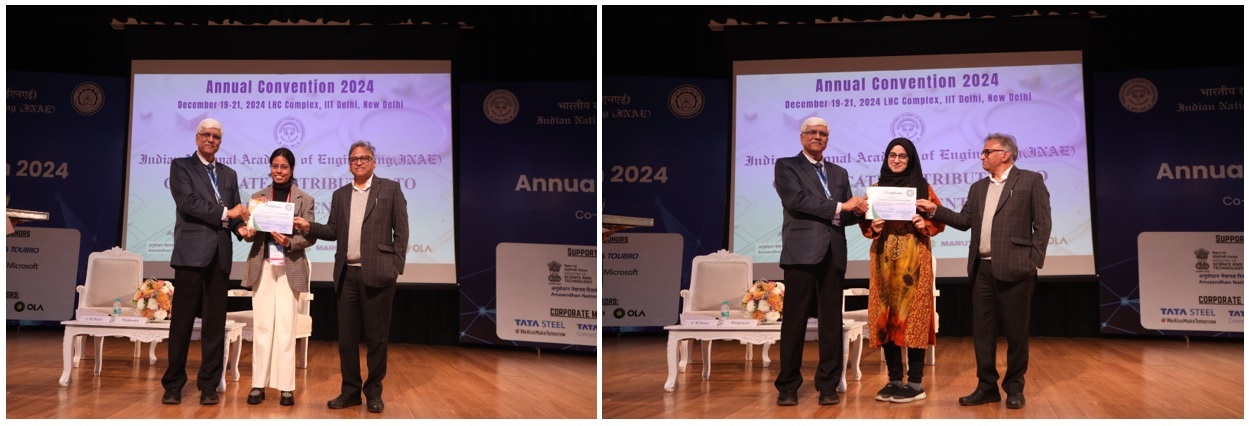 Prof Sivaji Chakravorti, Vice-President, INAE (Extreme left) and Prof. Naresh Bhatnagar, FNAE, Dean (R & D), IIT Delhi (Extreme Right) presenting Prizes to the Winners of the Poster Session
Prof Sivaji Chakravorti, Vice-President, INAE (Extreme left) and Prof. Naresh Bhatnagar, FNAE, Dean (R & D), IIT Delhi (Extreme Right) presenting Prizes to the Winners of the Poster Session
INAE Events
INAE Annual Convention 2024
The Indian National Academy of Engineering (INAE) Annual Convention 2024 was held on December 19-21, 2024 hosted at Indian Institute of Technology Delhi, New Delhi. The Convention of the Academy was mega event attended by Fellows, Foreign Fellows, Young Associates, Scientists, Faculty and students of IIT Delhi and Invitees. This year’s Annual Convention was made even more memorable as the Chief Guest of the Inaugural Session was Shri Rajnath Singh, Hon’ble Raksha Mantri, Ministry of Defence, Government of India. The Convention started with the traditional lighting of the lamp and invocation followed by the Welcome Addresses by Prof Indranil Manna, President, INAE and Prof. Rangan Banerjee, Director, IIT Delhi. A Visual Presentation on INAE was featured which gave a brief overview of Indian National Academy of Engineering (INAE) since inception and highlighted some of the major technical activities and contributions that have increased the visibility and outreach of the Academy in the National and International engineering domain. This was followed by release of Convention Souvenir featuring brief profiles of the newly elected Fellows, Foreign Fellows and Young Associates and it also contained details of the newly Instituted Memberships- Institutional, Corporate and Individual that has helped bring a larger section of the engineering community under the folds of the Academy.
The much awaited address by the Chief Guest Shri Rajnath Singh, Hon’ble Raksha Mantri was inspirational and though provoking and enthralled the august audience with his deep words of wisdom. During his speech he brought out that India is passing through a defining moment and will soon achieve a formidable technical edge in international arena. He exhorted scientists and engineers to specialise in high-end technologies for strengthening India’s position in cutting-edge innovation. He also emphasized the calls to stay connected with the country’s heritage while forging ahead and accentuated the need to establish better organic relationship among industry, R&D organisations and academia to achieve progress in disruptive technologies. The Chief Guest – Shri Rajnath Singh, Hon’ble Raksha Mantri, Ministry of Defence, Government of India and Guests of Honour –Dr Samir V Kamat, Secretary DDR&D and Chairman DRDO and Shri SN Subrahmanyan, Chairman & MD, Larsen & Toubro Ltd were felicitated by Prof Indranil Manna, President, INAE and Prof Rangan Banerjee, Director, IIT Delhi.
 Dignitaries on the Dais during Visual presentation on INAE in Inaugural Session: Left to Right – Prof Indranil Manna, FNAE, the then President, INAE; Guest of Honour – Shri SN Subrahmanyan, FNAE, Chairman & MD, Larsen & Toubro Ltd; Chief Guest – Shri Rajnath Singh, Hon’ble Raksha Mantri, Ministry of Defence, Government of India; Guest of Honour -Dr Samir V Kamat, FNAE, Secretary DDR&D and Chairman DRDO and Prof Rangan Banerjee, FNAE, Director, IIT Delhi
Dignitaries on the Dais during Visual presentation on INAE in Inaugural Session: Left to Right – Prof Indranil Manna, FNAE, the then President, INAE; Guest of Honour – Shri SN Subrahmanyan, FNAE, Chairman & MD, Larsen & Toubro Ltd; Chief Guest – Shri Rajnath Singh, Hon’ble Raksha Mantri, Ministry of Defence, Government of India; Guest of Honour -Dr Samir V Kamat, FNAE, Secretary DDR&D and Chairman DRDO and Prof Rangan Banerjee, FNAE, Director, IIT Delhi
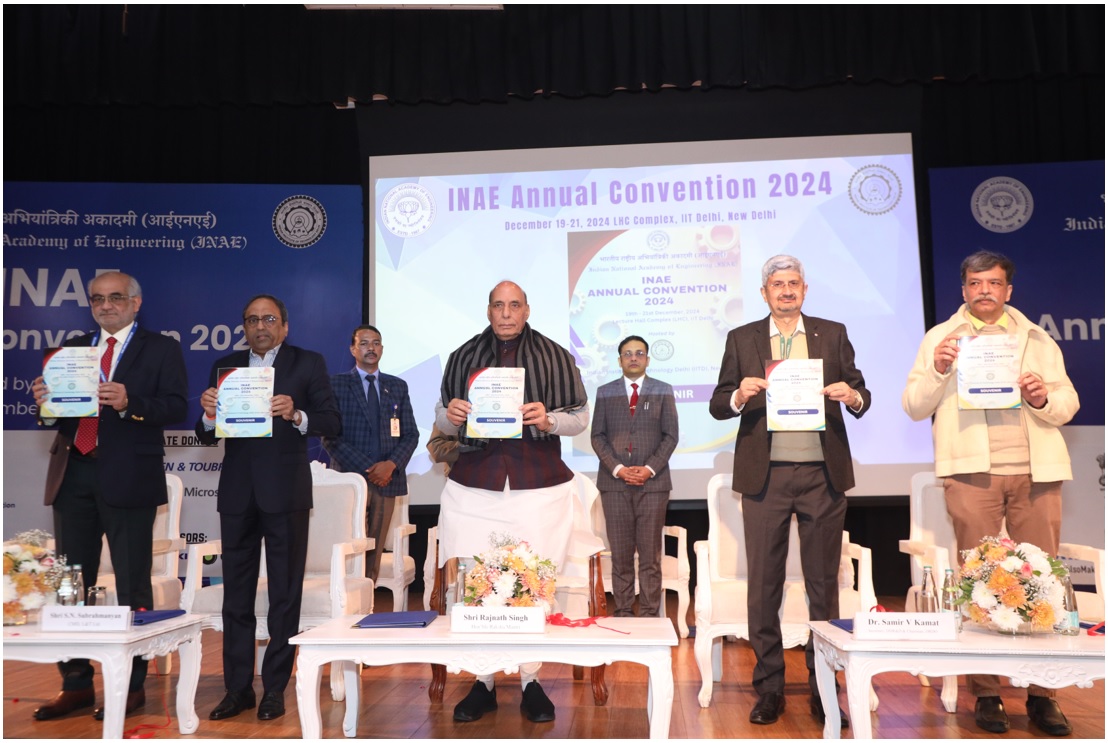 Release of INAE Annual Convention 2024 Souvenir by the Dignitaries on the Dais
Release of INAE Annual Convention 2024 Souvenir by the Dignitaries on the Dais
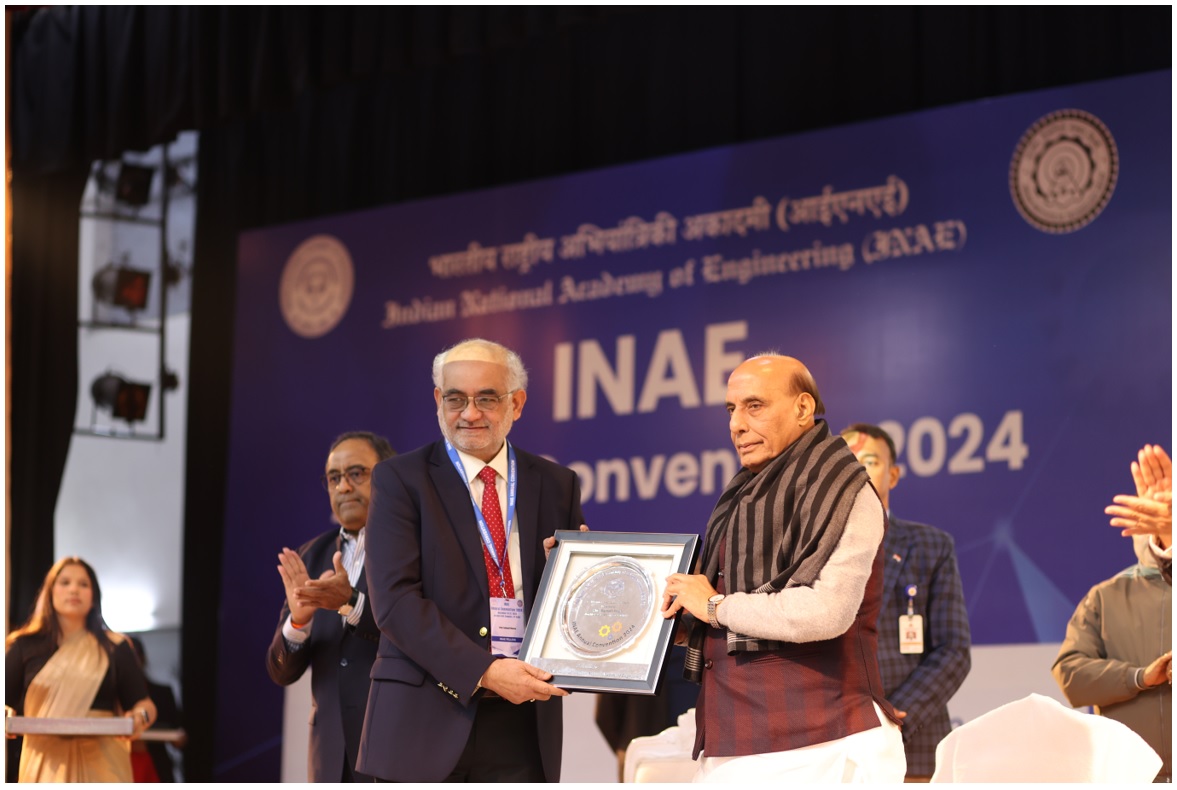 Presentation of Memento to the Chief Guest- Shri Rajnath Singh, Hon’ble Raksha Mantri, Ministry of Defence, Government of India by Prof Indranil Manna, the then President, INAE
Presentation of Memento to the Chief Guest- Shri Rajnath Singh, Hon’ble Raksha Mantri, Ministry of Defence, Government of India by Prof Indranil Manna, the then President, INAE
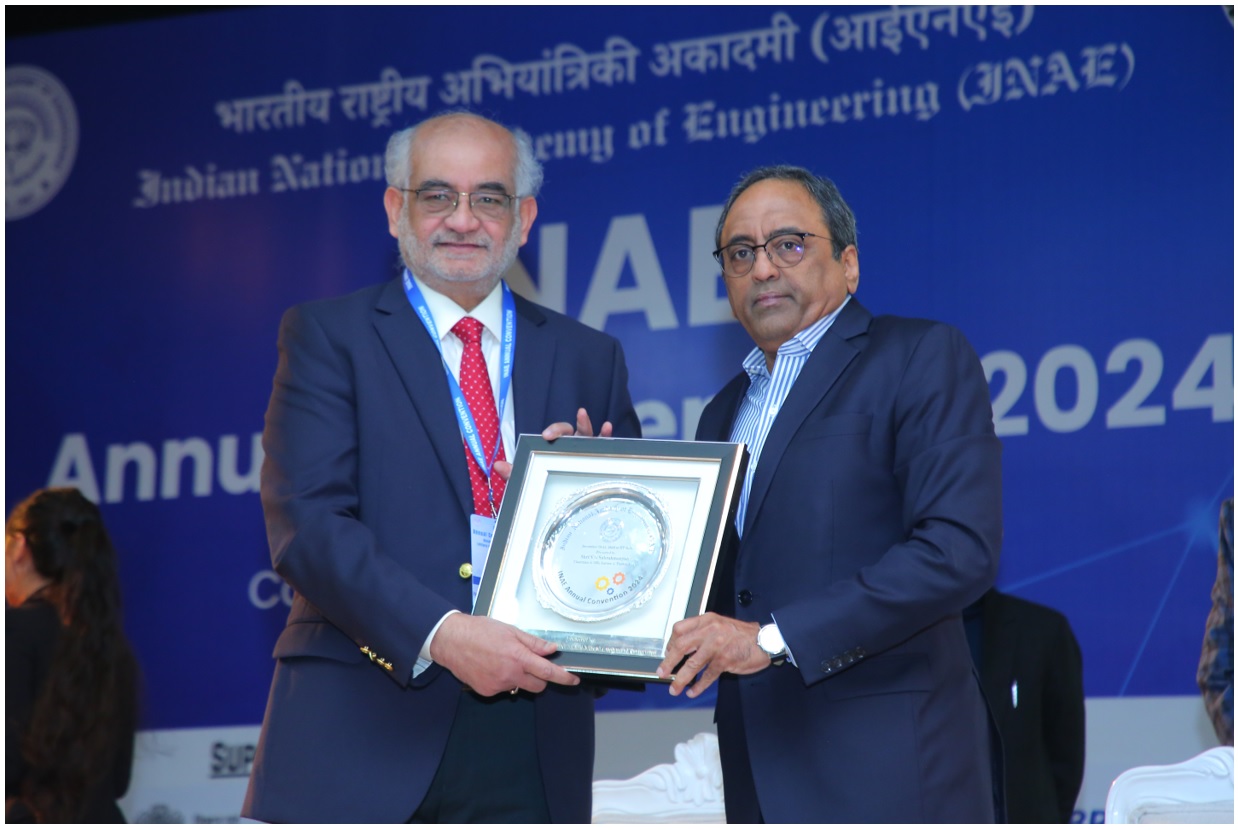 Presentation of Memento to the Guest of Honour – Shri SN Subrahmanyan, FNAE, Chairman & MD, Larsen & Toubro Ltd by Prof Indranil Manna, the then President, INAE
Presentation of Memento to the Guest of Honour – Shri SN Subrahmanyan, FNAE, Chairman & MD, Larsen & Toubro Ltd by Prof Indranil Manna, the then President, INAE
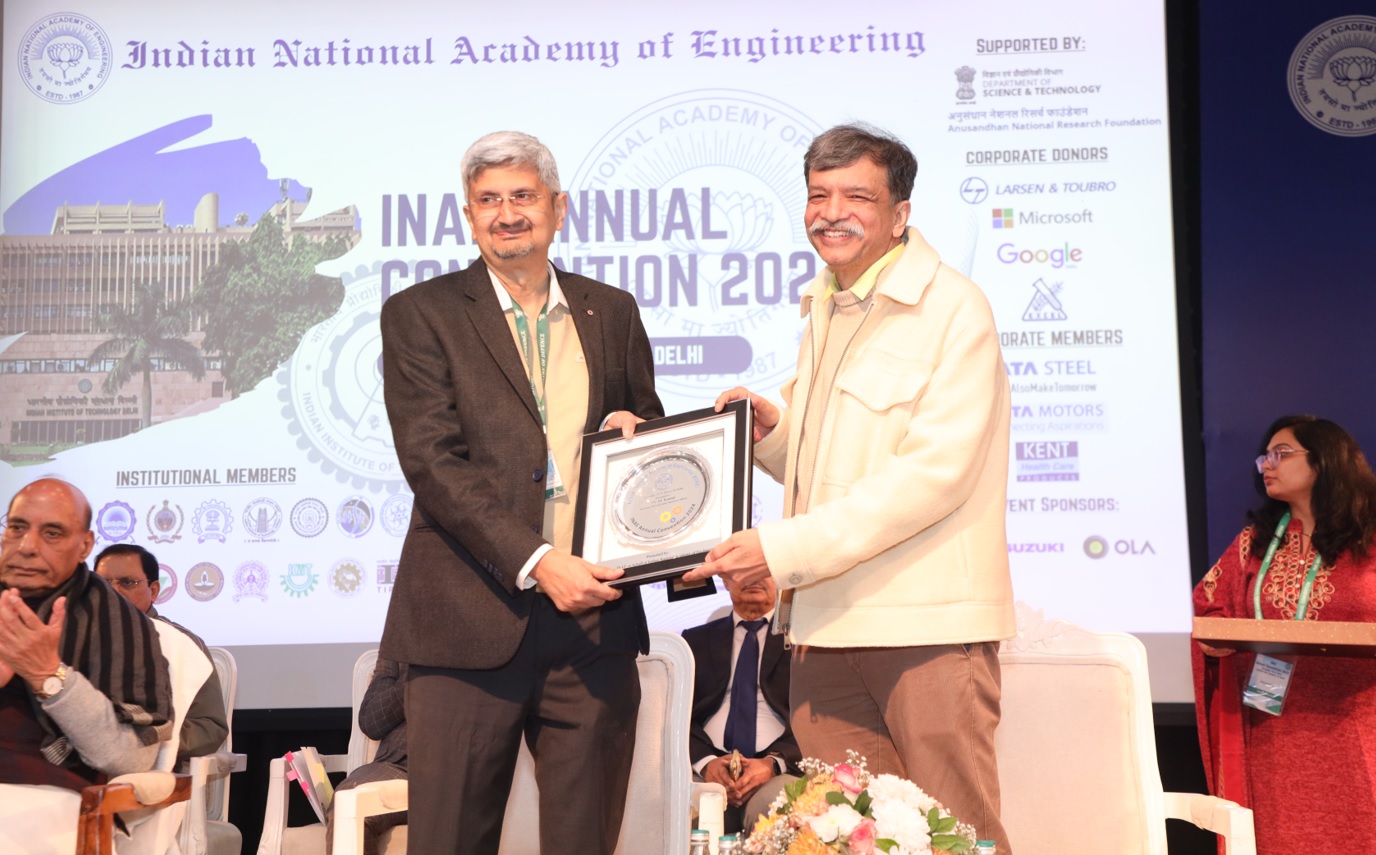 Presentation of Memento to the Guest of Honour – Dr Samir V Kamat, FNAE, Secretary DDR&D and Chairman DRDO by Prof Rangan Banerjee, FNAE, Director, IIT Delhi
Presentation of Memento to the Guest of Honour – Dr Samir V Kamat, FNAE, Secretary DDR&D and Chairman DRDO by Prof Rangan Banerjee, FNAE, Director, IIT Delhi
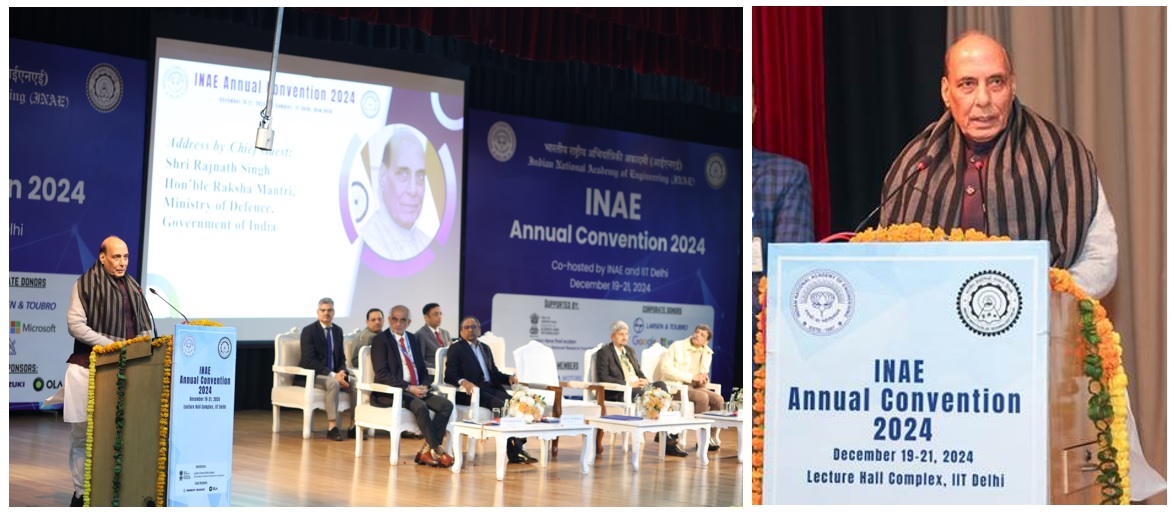 Chief Guest –Hon’ble Raksha Mantri Shri Rajnath Singh Delivering Inaugural Address
Chief Guest –Hon’ble Raksha Mantri Shri Rajnath Singh Delivering Inaugural Address
The highlights of the INAE Annual Convention 2024 on Day 1were the Lectures by eminent leaders in the field of engineering & technology: Plenary Lectures by Shri SN Subrahmanyan, Chairman & MD, Larsen & Toubro Ltd and Dr. SV Kamat, Secretary DDR&D and Chairman DRDO, Ministry of Defence, New Delhi; Key-note Lectures by Dr Ajay Kumar, former Secretary Defence (Production) and Defence Secretary, Ministry of Defence, New Delhi and Dr. Ajay Mathur, DG, International Solar Alliance and Distinguished Lectures by Dr Manish Gupta, Director, Google Research India, Bangalore and Dr. SK Sarin, Director, ILBS and Former President, NAMS, a medical practitioner who highlighted the interface of engineering with medicine.
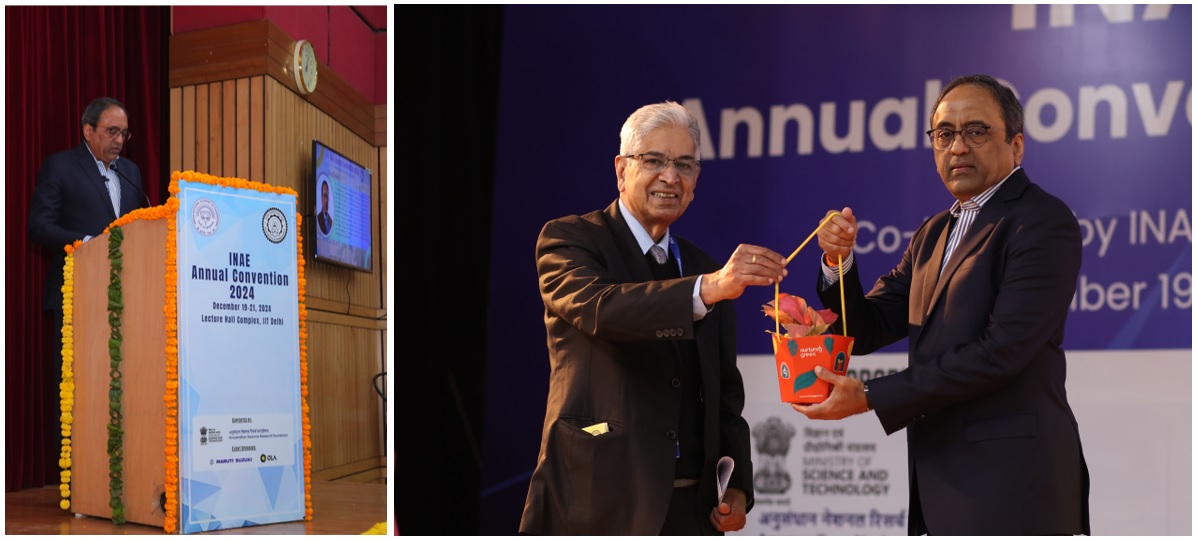 Plenary Lecture being delivered by Shri SN Subrahmanyan, FNAE, Chairman & MD, Larsen & Toubro Ltd and Dr BN Suresh, Former President, INAE Presenting a Token of Gratitude to him on behalf of INAE
Plenary Lecture being delivered by Shri SN Subrahmanyan, FNAE, Chairman & MD, Larsen & Toubro Ltd and Dr BN Suresh, Former President, INAE Presenting a Token of Gratitude to him on behalf of INAE
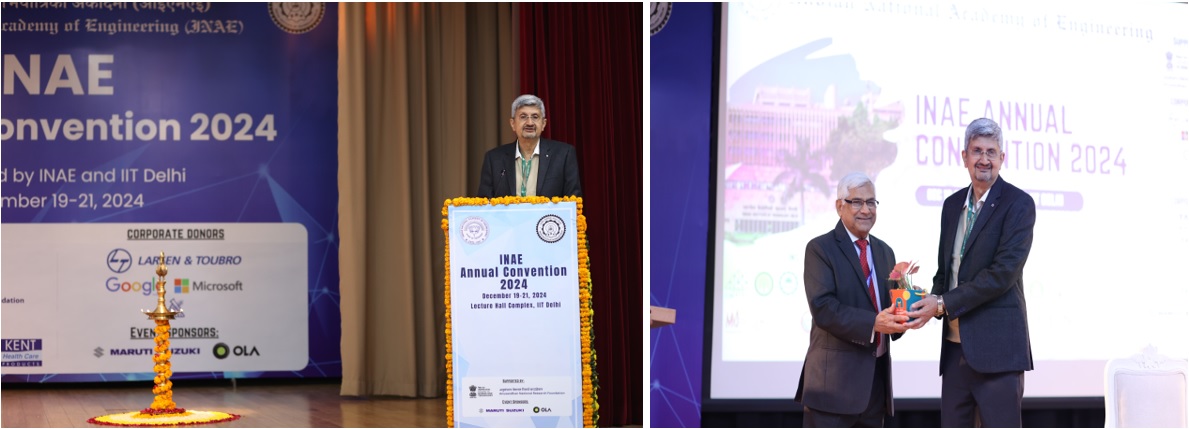 Plenary Lecture being delivered by Dr. SV Kamat, Secretary DDR&D and Chairman DRDO, Ministry of Defence, New Delhi and Dr Sanak Mishra, Former President, INAE Presenting a Token of Gratitude to him on behalf of INAE
Plenary Lecture being delivered by Dr. SV Kamat, Secretary DDR&D and Chairman DRDO, Ministry of Defence, New Delhi and Dr Sanak Mishra, Former President, INAE Presenting a Token of Gratitude to him on behalf of INAE
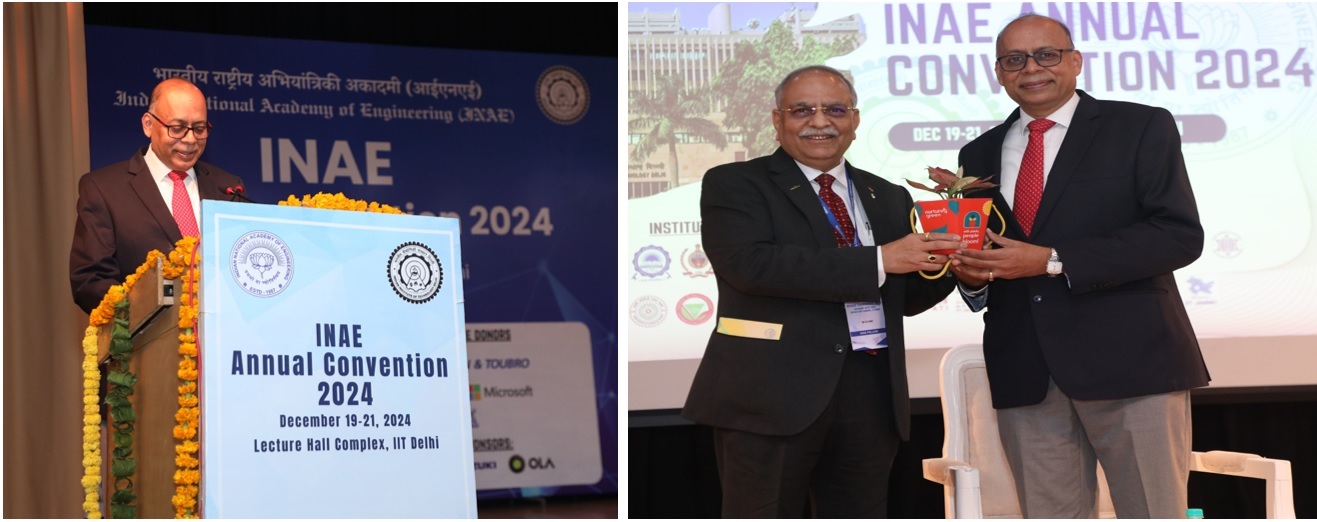 Key-note Lecture being delivered by Dr Ajay Kumar, former Secretary Defence (Production) and Defence Secretary, Ministry of Defence, New Delhi and Mr JD Patil, the then President Designate, INAE Presenting a Token of Gratitude to him on behalf of INAE
Key-note Lecture being delivered by Dr Ajay Kumar, former Secretary Defence (Production) and Defence Secretary, Ministry of Defence, New Delhi and Mr JD Patil, the then President Designate, INAE Presenting a Token of Gratitude to him on behalf of INAE
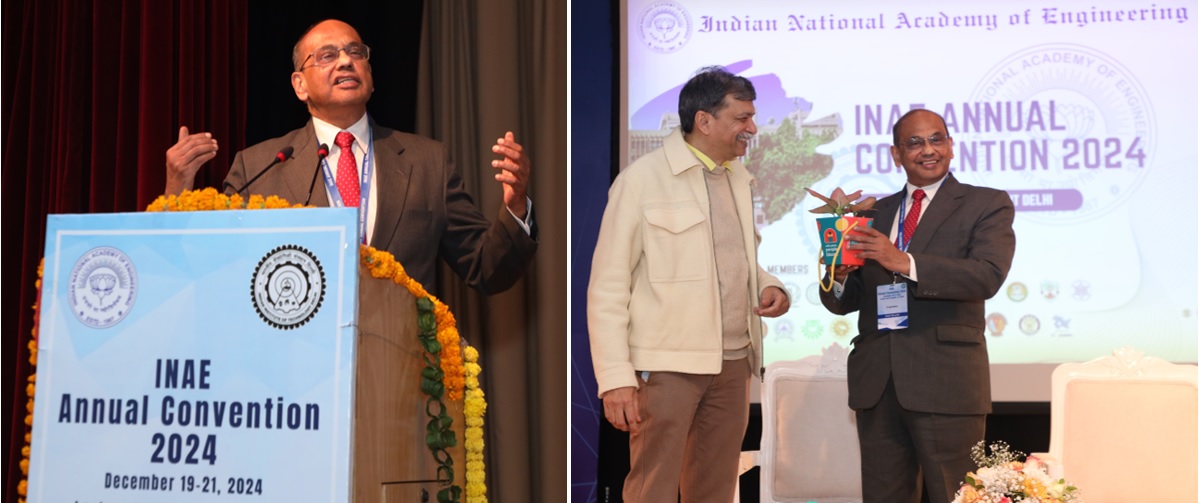 Key-note Lecture being delivered by Dr. Ajay Mathur, DG, International Solar Alliance and Prof Rangan Banerjee, FNAE, Director, IIT Delhi Presenting a Token of Gratitude to him on behalf of INAE
Key-note Lecture being delivered by Dr. Ajay Mathur, DG, International Solar Alliance and Prof Rangan Banerjee, FNAE, Director, IIT Delhi Presenting a Token of Gratitude to him on behalf of INAE
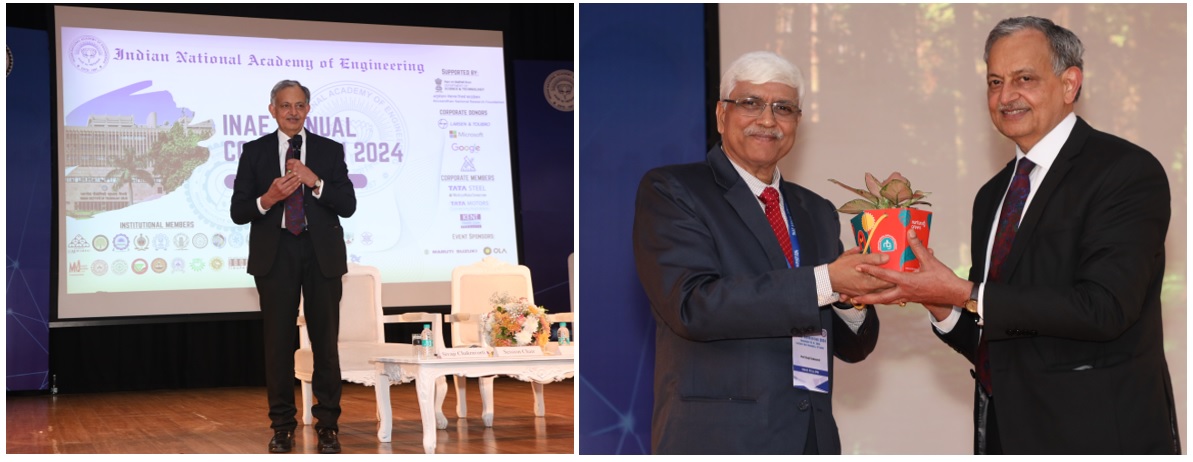 Distinguished Lecture being delivered by Dr. SK Sarin, Director, ILBS and Former President, NAMS and Prof Sivaji Chakravorti, Vice President, INAE Presenting a Token of Gratitude to him on behalf of INAE
Distinguished Lecture being delivered by Dr. SK Sarin, Director, ILBS and Former President, NAMS and Prof Sivaji Chakravorti, Vice President, INAE Presenting a Token of Gratitude to him on behalf of INAE
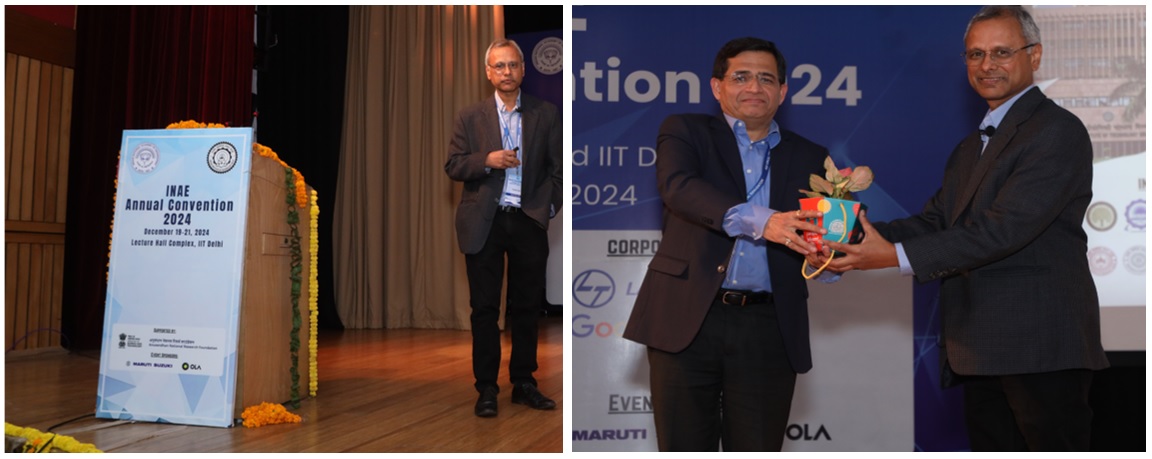 Distinguished Lecture being delivered by Dr Manish Gupta, Director, Google Research India, Bangalore and Dr Rajeev Shorey, FNAE Presenting a Token of Gratitude to him on behalf of INAE
Distinguished Lecture being delivered by Dr Manish Gupta, Director, Google Research India, Bangalore and Dr Rajeev Shorey, FNAE Presenting a Token of Gratitude to him on behalf of INAE
The INAE Governing Council Meeting was held on the evening of Dec 19, 2024 as per practice each year in the month of December 2024. An “Elevating Program” by SPIC MACAY was organized before the dinner on Day 1 featuring an entertaining Kathak recital by the famous artiste Vidushi Shovana Narayan.
 Kathak recital by SPIC MACAY by artiste Vidushi Shovana Narayan and the troupe
Kathak recital by SPIC MACAY by artiste Vidushi Shovana Narayan and the troupe
The second day of the INAE Annual Convention i.e. Dec 20, 2024 commenced with the brief presentations on Technical Reports by the Conveners of the 10 INAE Sectional Committees based on the 10 broad based INAE Engineering Sections covering the entire spectrum of engineering disciplines. The genesis of this initiative is that the INAE Sectional Committees were requested to prepare 1-2 reports as a Technology Forecast/Review/Gap Analysis/Databases/analytics Document which is unique so as to make a marked difference in the respective domains and serve as a reference document for Government Departments/Agencies and other stakeholders as a roadmap for advancing the technology area in the country. The presentations highlighted the roadmap documents under preparation and were well appreciated.
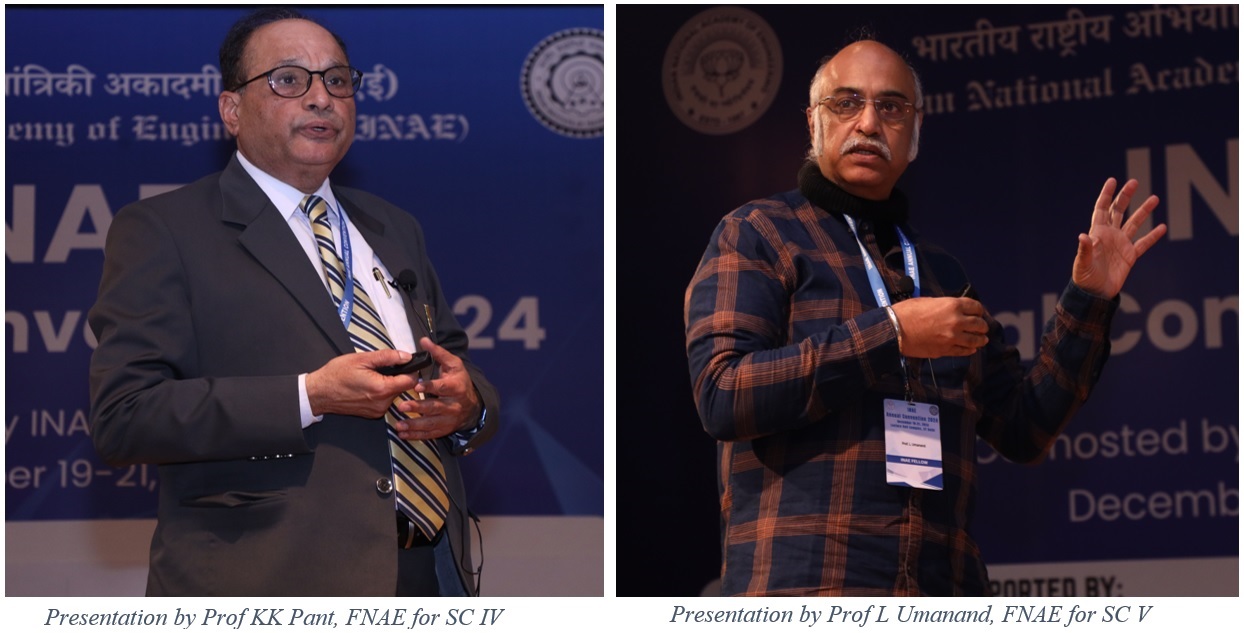
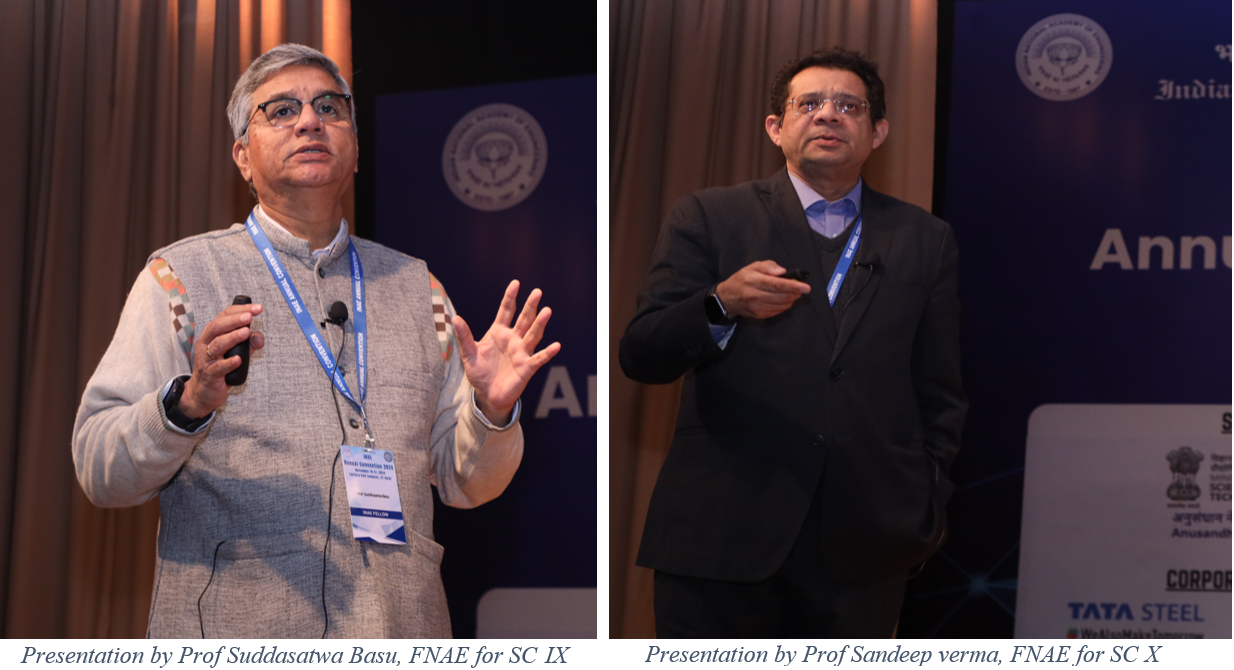
The main technical features of Day 2 were the technical presentations by the newly elected Fellows and Young Associates on their engineering contributions that have brought them acclaim and have led to their election as Fellows and selection as Young Associates. The lectures were followed by Q&A and were illuminating and inspired the audience and also guided the student attendees who were enthused in their research work by the depth of knowledge and skills of the presenters.
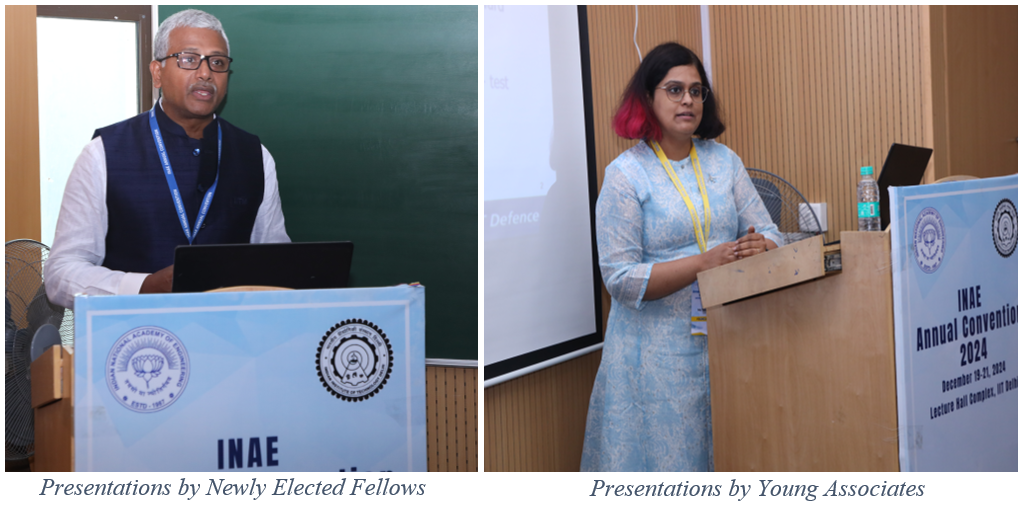
The evening session commenced with a Panel Discussion on “Road Map for Viksit Bharat” moderated by Prof Indranil Manna, President, INAE and the panellists were eminent experts from Academia/R&D organizations and Industry viz Dr. Tapan Sahoo, Executive Director (Engineering), Maruti Suzuki India Limited who covered the topic “Mobility” Dr. Mahesh Gupta, Chairman & MD, Kent RO Systems Ltd. Who touched upon “Water & Sanitation”; Prof. Manindra Agrawal, Director, IIT Kanpur who spoke on “Cyber Security” and “Renewable Energy” was covered by Dr. Ajay Mathur, DG, ISA, New Delhi. The Panellists responded to pertinent questions and expounded the challenges and opportunities on the path to a Viksit Bharat as envisaged by the Hon’ble Prime Minister by 2047. The deep insight and perception of the panellists added value to the rich technical content of the programme and were much appreciated by the eminent audience and students alike.
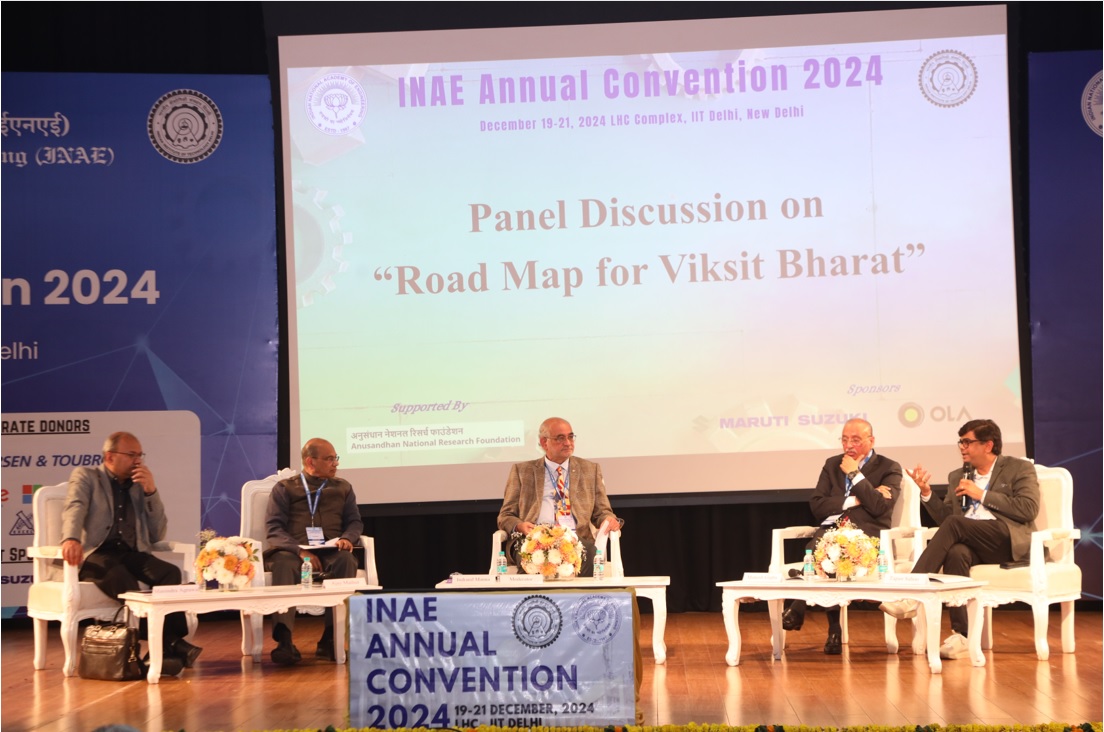 Panel Discussion on “Road Map for Viksit Bharat” (Left to Right) –Prof Manindra Agrawal, FNAE, Director, IIT Kanpur; Dr. Ajay Mathur, DG, ISA; Prof Indranil Manna, the then President, INAE; Dr. Mahesh Gupta, Chairman & MD, Kent RO Systems Ltd and Dr. Tapan Sahoo, Executive Director (Engineering), Maruti Suzuki India Limited
Panel Discussion on “Road Map for Viksit Bharat” (Left to Right) –Prof Manindra Agrawal, FNAE, Director, IIT Kanpur; Dr. Ajay Mathur, DG, ISA; Prof Indranil Manna, the then President, INAE; Dr. Mahesh Gupta, Chairman & MD, Kent RO Systems Ltd and Dr. Tapan Sahoo, Executive Director (Engineering), Maruti Suzuki India Limited
This was followed by a motivational Fireside Chat in the areas of “Manufacturing” and “AI” with Mr. Bhavish Aggarwal, Founder & Chairman of Ola Consumer, Ola Electric, and India’s first AI unicorn Ola Krutrim as the Guest. The Session was moderated by Prof UB Desai, Vice-President, INAE who asked pertinent questions and the session was interesting, informative and the interactive part much appreciated by one and all. The essence of the Fireside Chat was that not only the technical issues were highlighted but the informal discussions and questions by the students of IIT Delhi enthused them and brought out the importance and success of entrepreneurship of the Guest, as an example to be emulated. The Networking Dinner was a befitting closure to Day 2 after a day filled with technical inputs and provided a platform for meaningful interactions.
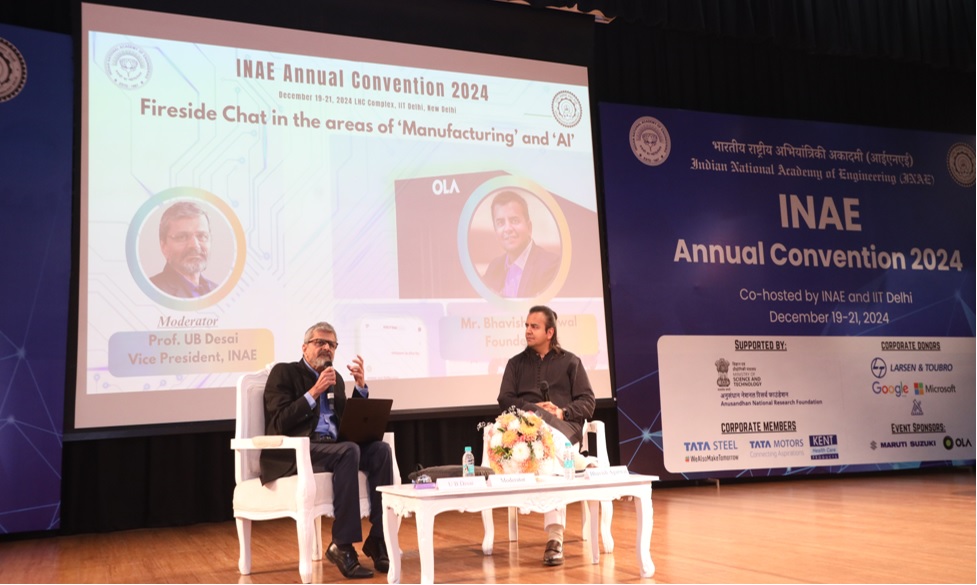 Fireside Chat Moderated by Prof UB Desai, Vice-President, INAE (Left) with Mr. Bhavish Aggarwal, Founder & Chairman of Ola Consumer, Ola Electric, and India’s first AI unicorn Ola Krutrim (Right) as the Guest
Fireside Chat Moderated by Prof UB Desai, Vice-President, INAE (Left) with Mr. Bhavish Aggarwal, Founder & Chairman of Ola Consumer, Ola Electric, and India’s first AI unicorn Ola Krutrim (Right) as the Guest
The third day of the INAE Annual Convention 2024 commenced with the Session on Follow-up discussion on “AI/ML: Future Directions, Threats, and Way Forward” moderated by Prof. UB Desai, Former IIT Hyderabad Director and Vice-President, INAE. The Panellists were eminent industry experts viz: Dr. Anand Deshpande, Founder, Chairman and Managing Director of Persistent Systems; Prof. Vineeth N Balasubramanian, IIT Hyderabad; Dr. Rajeev Rastogi, VP ML Amazon India; Dr. Harish Iyer, Melinda and Bill Gates Foundation and Dr. Shubhashis Gangopadhyay, Vice Chairperson, Center for Digital Future, and Founding Dean of ISPP, Economics, Law, Policy Praxis Lab. The relevant issues in the field of Artificial Intelligence and Machine Learning and the challenges and opportunities for advancement in this field that shall help progress of the nation and also ensure a better life for the citizens were deliberated during the discussion.
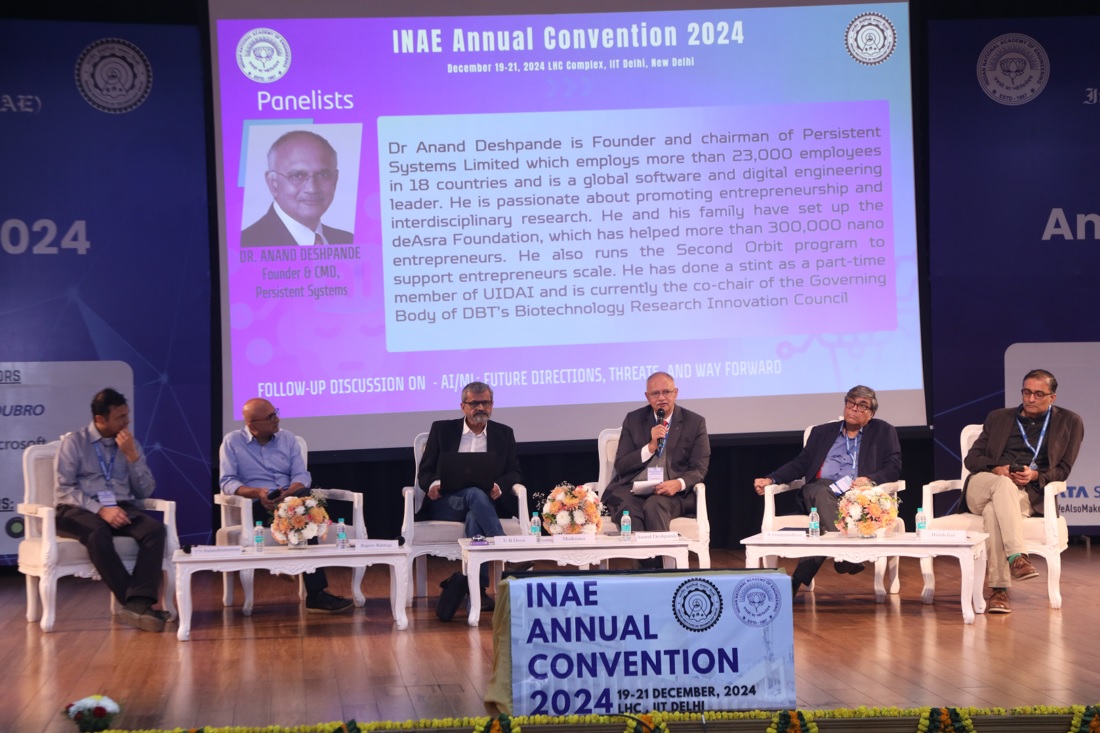 Session on AI/ML: Future Directions, Threats, and Way Forward” moderated by Prof. UB Desai, Vice-President, INAE (Left to Right) Prof. Vineeth N Balasubramanian, IIT Hyderabad; Dr. Rajeev Rastogi, VP ML Amazon India; Prof. UB Desai, Vice-President, INAE; Dr. Anand Deshpande, Founder, Chairman and Managing Director of Persistent Systems; Dr. Shubhashis Gangopadhyay, Vice Chairperson, Center for Digital Future, and Founding Dean of ISPP, Economics, Law, Policy Praxis Lab and Dr. Harish Iyer, Melinda and Bill Gates Foundation.
Session on AI/ML: Future Directions, Threats, and Way Forward” moderated by Prof. UB Desai, Vice-President, INAE (Left to Right) Prof. Vineeth N Balasubramanian, IIT Hyderabad; Dr. Rajeev Rastogi, VP ML Amazon India; Prof. UB Desai, Vice-President, INAE; Dr. Anand Deshpande, Founder, Chairman and Managing Director of Persistent Systems; Dr. Shubhashis Gangopadhyay, Vice Chairperson, Center for Digital Future, and Founding Dean of ISPP, Economics, Law, Policy Praxis Lab and Dr. Harish Iyer, Melinda and Bill Gates Foundation.
The Annual General Meeting and Special General Meeting of the Fellows brought an end to the technical events and deliberations and the Induction Ceremony of newly elected Fellows, Foreign Fellows and Young Associates was a memorable moment for the new inductees, as well as their peers and parent organizations to whom they have brought glory by advancing the growth of engineering and technology in their respective domains. After the Networking Lunch the delegates bade farewell and would look forward to the Conventions in future years, as a Calendar event that would be eagerly awaited with meaningful outcomes.
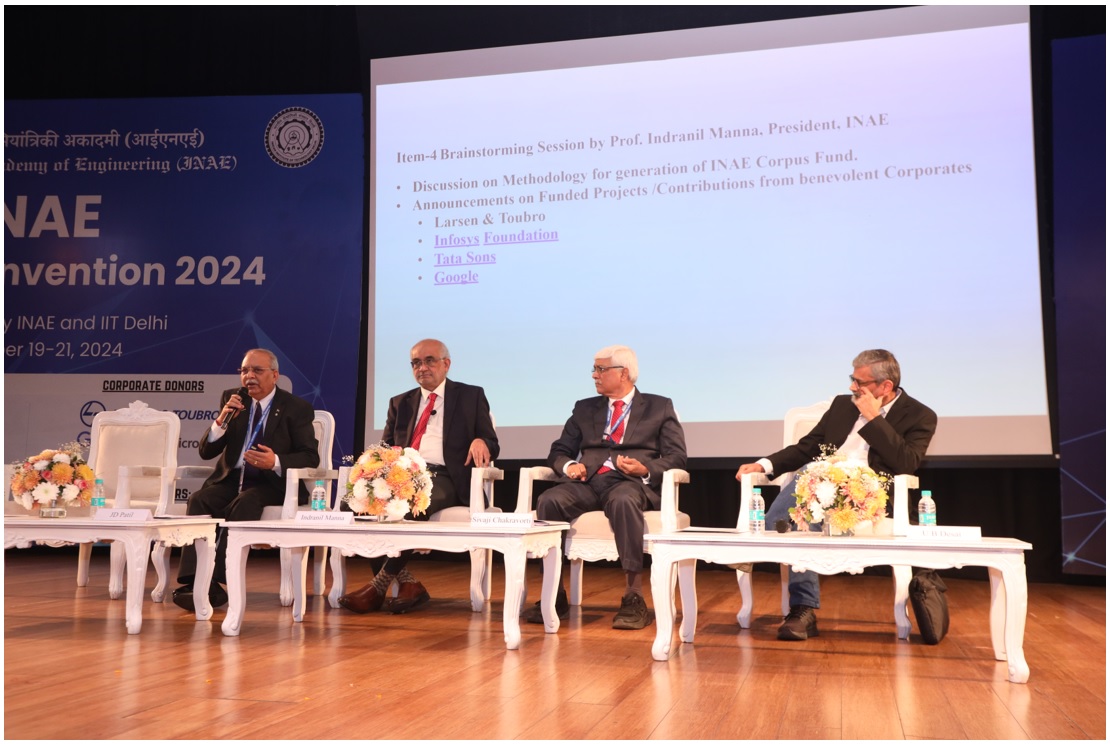 AGM in Progress: (Left to Right) Mr JD Patil, the then president, Designate, INAE; Prof Indranil Manna, the then President, INAE; Prof Sivaji Chakravorti, Vice-President, INAE and Prof UB Desai, Vice-President, INAE.
AGM in Progress: (Left to Right) Mr JD Patil, the then president, Designate, INAE; Prof Indranil Manna, the then President, INAE; Prof Sivaji Chakravorti, Vice-President, INAE and Prof UB Desai, Vice-President, INAE.
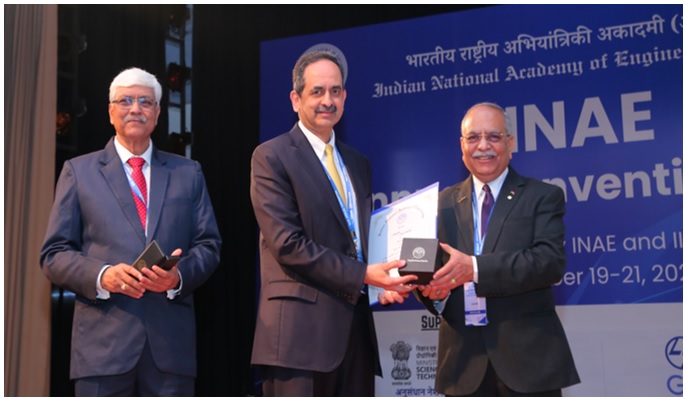 Mr Sanjay Kirloskar Being Inducted as an INAE Fellow by Prof Indranil Manna, the then President, INAE in presence of Prof Sivaji Chakravorti, Vice-President, INAE.
Mr Sanjay Kirloskar Being Inducted as an INAE Fellow by Prof Indranil Manna, the then President, INAE in presence of Prof Sivaji Chakravorti, Vice-President, INAE.
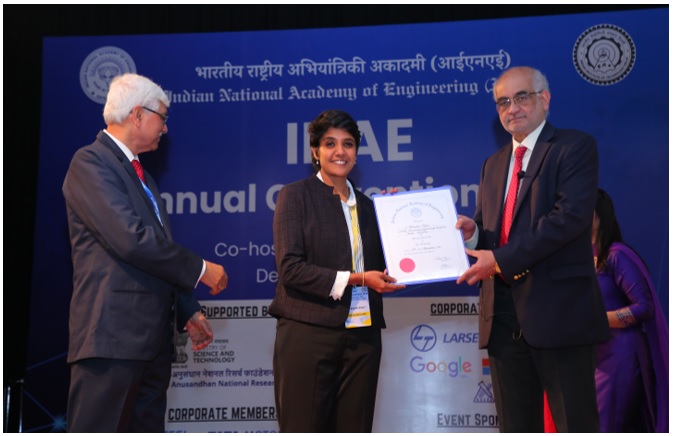 Dr C Bharathi Priya Being Inducted as a Young Associate by Prof Indranil Manna, the then President, INAE in presence of Prof Sivaji Chakravorti, Vice-President, INAE.
Dr C Bharathi Priya Being Inducted as a Young Associate by Prof Indranil Manna, the then President, INAE in presence of Prof Sivaji Chakravorti, Vice-President, INAE.
(To view all photographs of the INAE Annual Convention 2024 click on the link https://www.dropbox.com/scl/fo/b722xym7r2xxbq8spfi0b/ABNiMIJ2TSZK1AksIPGwykU?rlkey=ax6f2isivbh6sequeddda3t2i&st=kib7nosr&dl=0)
The INAE Annual Convention 2024 was supported by Department of Science and Technology (DST), Government of India and Anusandhan National Research Foundation (ANRF) and partly sponsored by Maruti Suzuki Innovation and Ola.
Local Chapter Activities and Webinar Series held during October 2024 to January 2025
The following Webinars/activities/meetings/Technical Lectures were conducted during October 2024 to January 2025 by INAE and Local Chapters.
INAE Bhubaneswar Chapter
(i) The 40th Distinguished Lecture of INAE Distinguished Lecture Series was jointly organised by INAE Bhubaneswar Chapter, SOA University, CSIR-IMMT Bhubaneswar, IIT Bhubaneswar, NISER Bhubaneswar and IEEE Bhubaneswar Sub-section and delivered by Prof. Sudeshna Sarkar, Professor, Department of Computer Science & Engineering, IIT Kharagpur on 1st October 2024 on “Uncovering Bias and Perspectives in News: NLP Approaches for Automated Content Analysis” in virtual mode.
Key Points: In today’s media landscape, where news reporting is often subjective, understanding diverse perspectives is essential. This talk delved into automated news content analysis using Natural Language Processing (NLP) techniques to extract events and arguments, and for examining biases and variations in news coverage. They focused on identifying selection, coverage, and statement biases through both machine learning (ML) and large language model (LLM)-based approaches. Key tasks included event extraction, stakeholder analysis, sentiment prediction, and bias detection, with a particular emphasis on few-shot and zero-shot settings to enhance model generalizability across various news domains. Notable contributions include a joint event extraction model, a natural language inference method for news aspect identification, and stakeholder classification using P-tuning. Additionally, they explored methods to mitigate sentiment bias in news articles using sentence rewriting techniques. This research introduces innovative methodologies, advancing computational journalism and providing valuable tools for analyzing modern media narratives.
You Tube Video Recording Link : https://youtu.be/U2L9wdbXTNk
People Participated: 62
(ii) The 41st Distinguished Lecture of INAE Distinguished Lecture Series was jointly organised by INAE Bhubaneswar Chapter, SOA University, CSIR-IMMT Bhubaneswar, IIT Bhubaneswar, NISER Bhubaneswar and IEEE Bhubaneswar Sub-section and delivered by Dr. Shankar S Mantha, Chancellor, RB University, Nagpur on 3rd October, 2024 on “AI in Education” in virtual mode.
Key Points: The application of Artificial Intelligence (AI) in education holds the potential to revolutionize the learning experience for both educators and students. AI technologies, such as sentiment analysis algorithms, can be trained to interpret complex emotions and concepts, including those found in Sanskrit Shlokas. By identifying not only the positive or negative sentiments but also the specific emotions conveyed in the text, AI offers deeper insights into educational content and emotional intelligence, paving the way for more personalized and effective learning experiences.
You Tube Video Recording Link : https://youtu.be/zs7Mibf94vM
People Participated: 49
(iii) The 42nd Distinguished Lecture of INAE Distinguished Lecture Series was jointly organised by INAE Bhubaneswar Chapter, SOA University, CSIR-IMMT Bhubaneswar, IIT Bhubaneswar, NISER Bhubaneswar and IEEE Bhubaneswar Sub-section and delivered by Prof. Debdeep Mukhopadhyay, Institute Chair Professor, Dept. of Computer Science and Engineering, Indian Institute of Technology Kharagpur on 30th October, 2024 on “Hardware Security in the Modern World: From Things to Cloud” in virtual mode.
Key Points: Cryptography plays a vital role in securing electronic transactions. However, in spite of their mathematical robustness when these algorithms are translated to concrete implementations there can be opportunities for attacks due to weaknesses in underlying implementations. Hardware Security addresses this gap between theory and practice, and attempts to model these menacing side-channel leakages. The talk emphasized some key findings in this amazing journey of translating crypto-theory to practically secure-systems, starting with an optimal differential-fault-analysis of the Advanced-Encryption-Standard, which is the de-facto standard block-cipher world-wide. Subsequently, a quick peek was taken into the contributions in fault-tolerance in cryptography, where the researchers unearth how countermeasures can be compromised using novel fault-analysis, along with how such countermeasures can be assessed for leakage using scalable test-methodologies. The talk then shifted its focus to the domain of micro-architectural leakages which presents some of the earliest reports world-wide of exposing how computer architecture developed with only performance in perspective can compromise ciphers. The talk subsequently briefed their fundamental contributions in promoting usage of novel hardware-security primitives, called Physically-Unclonable-Functions for authentication in resource constrained environments, like Internet-of –Things (IoT). The talk concluded with their recent break-through in making encrypted-search a reality, addressing privacy concerns in the pervasive cloud.
You Tube Video Recording Link : https://youtu.be/DnF9QUmb5aY
People Participated: 178
(iv) The 43rd Distinguished Lecture of INAE Distinguished Lecture Series was jointly organised by INAE Bhubaneswar Chapter, SOA University, CSIR-IMMT Bhubaneswar, IIT Bhubaneswar, NISER Bhubaneswar and IEEE Bhubaneswar Sub-section and delivered by Dr. Shibashish Giri, Endogenous stem cell specialist in Medical Research and Therapy in Medical faculty of University of Leipzig and Technical University of Munich, Germany and Chief Scientific Officer (AB Company, UK, USA) adjunct professor in MIPT, Moscow, Russia and other European Universities on 13th November, 2024 on “Nobel Discoveries for Health and wellness” in virtual mode.
Key Points: The Nobel Prize-winning technology of 2023 in medicine have witnessed a revolutionary development in the field of mRNA technology in medicine, have now become universally accepted for best solution for both early diagnostic as well as for therapeutic applications for all kind of diseases. The researchers have also discovered wide range of mRNA and established mRNA profiles to detect diabetic, prediabetic, osteoporosis, heart blockage, liver cancer, fatty liver and breast cancer in 5 to 7 years in advance. Conventional diagnostics are complex, expensive and time consuming, but the mRNA diagnostic could be a simple, blood based super sensitive diagnostic tool to detect the diseases in very early stage. Crucially, mRNA technology is simple enough that it should be possible to make these next generations of treatments and diagnostic wide range diseases around the world including Odisha, at low cost, even in places with few resources. The mRNA-based inventions presented could be a next generation state-of-the-art technique in early diagnostic tools production and have huge therapeutic potentials.
You Tube Video Recording Link : https://youtu.be/AyvTe6U2tQU
People Participated: 125
(v) The 44th Distinguished Lecture of INAE Distinguished Lecture Series was jointly organised by INAE Bhubaneswar Chapter, SOA University, CSIR-IMMT Bhubaneswar, IIT Bhubaneswar, NISER Bhubaneswar and IEEE Bhubaneswar Sub-section and delivered by Prof. Ashok Kumar Gupta, Professor (HAG) in the Environmental Engineering Division in the Department of Civil Engineering at the Indian Institute of Technology Kharagpur on 14th November 2024 on “Transforming India’s water and wastewater management: Treatment technologies, Sustainable Practices, and Resource Recovery” in virtual mode.
Key Points: With the advent of human civilization, water and wastewater management have been integral aspects of human life, as evident from the developments of the Indus Valley civilization. While certain challenges remain unchanged, such as the need for clean water, advancements in technology, and population growth have introduced new complexities that must be addressed scientifically and sustainably. In this regard, the presentation addressed the state of water and wastewater management in India. It emphasized the amount of wastewater generated, existing treatment technologies, and policy aspects. It also highlighted natural and sustainable methods for treating wastewater, along with effective fecal sludge management techniques and resource recovery practices. Additionally, the discussion covered current water demand, the installed capacity of water treatment plants, and innovative space-saving technologies. Furthermore, various government initiatives for water supply in both rural and urban areas were presented. By focusing on these aspects, the presentation aimed to provide insights into the challenges and solutions for managing water resources effectively across the country.
You Tube Video Recording Link : https://youtu.be/oiMu_FZ7t8Q
People Participated: 65
(vi) The 45th Distinguished Lecture of INAE Distinguished Lecture Series was jointly organised by INAE Bhubaneswar Chapter, SOA University, CSIR-IMMT Bhubaneswar, IIT Bhubaneswar, NISER Bhubaneswar and IEEE Bhubaneswar Sub-section and delivered by Prof. Makarand Madhao Ghangrekar, Director of National Institute of Technology, Puducherry and Professor in Department of Civil Engineering, IIT Kharagpur on 16 November, 2024 on “Biological and bio-electrochemical wastewater treatment technologies and their efficacies for imparting sustainability to wastewater treatment”.
(vii) The 46th Distinguished Lecture of INAE Distinguished Lecture Series was jointly organised by INAE Bhubaneswar Chapter, SOA University, CSIR-IMMT Bhubaneswar, IIT Bhubaneswar, NISER Bhubaneswar and IEEE Bhubaneswar Sub-section and delivered by Prof. Pradip Dutta, Professor, Centre for Energy Research, Department of Mechanical Engineering, Indian Institute of Science, Bangalore on 25th November, 2024 on “Transition to Clean Energy – New R&D Opportunities for Engineers” in virtual mode.
(viii) The 47th Distinguished Lecture of INAE Distinguished Lecture Series was jointly organised by INAE Bhubaneswar Chapter, SOA University, CSIR-IMMT Bhubaneswar, IIT Bhubaneswar, NISER Bhubaneswar and IEEE Bhubaneswar Sub-section and delivered by Prof. Hirendra N. Ghosh, National Institute of Science Education and Research (NISER), Bhubaneswar, Odisha on 26th November 2024 on “Ultrafast Charge Carrier Dynamics of 2D-Transition Metal Chalcogenides Based Heterosystems” in virtual mode.
(ix) The 48th Distinguished Lecture of INAE Distinguished Lecture Series was jointly organised by INAE Bhubaneswar Chapter, SOA University, CSIR-IMMT Bhubaneswar, IIT Bhubaneswar, NISER Bhubaneswar and IEEE Bhubaneswar Sub-section and delivered by Shri Skuanta Nanda, Architect and Mentor, AI and HPC Research Center, IIT Bhubaneswar on 28th November, 2024 on “Cybersecurity Attacks and Risk Mitigation Strategies for Critical Infrastructures’ in virtual mode.
(x) The 49th Distinguished Lecture of INAE Distinguished Lecture Series was jointly organised by INAE Bhubaneswar Chapter, SOA University, CSIR-IMMT Bhubaneswar, IIT Bhubaneswar, NISER Bhubaneswar and IEEE Bhubaneswar Sub-section and delivered by Prof. Sunil Murlidhar Shastri, Consultant, Educator and Speaker in Ocean and Environmental Governance on 6th December, 2024 on “One Ocean, Three Approaches, Five Issues, Seven Solutions” in virtual mode.
(xi) The 50th Distinguished Lecture of INAE Distinguished Lecture Series was jointly organised by INAE Bhubaneswar Chapter, SOA University, CSIR-IMMT Bhubaneswar, IIT Bhubaneswar, NISER Bhubaneswar and IEEE Bhubaneswar Sub-section and delivered by Prof. Jyotsna Dutta Majumdar, FNAE, Institute Chair Professor, Dept. of Metallurgical & Materials Engineering, Indian Institute of Technology Kharagpur on 10th December, 2024 on “Increased Lifetime of Metallic Bio-Implants by Surface Engineering” in virtual mode.
(xii) The 51st Distinguished Lecture of INAE Distinguished Lecture Series was jointly organised by INAE Bhubaneswar Chapter, SOA University, CSIR-IMMT Bhubaneswar, IIT Bhubaneswar, NISER Bhubaneswar and IEEE Bhubaneswar Sub-section and delivered by Prof. Durga Misra, Department of Electrical and Computer Engineering, New Jersey Institute of Technology, Newark on 30th December, 2024 on “Low Power Devices for In-Memory Computing Hardware” in hybrid mode.
(xiii) The 52nd lecture of the INAE Distinguished Lecture Series was organized by INAE Bhubaneswar Chapter, jointly with SOA University, CSIR-IMMT Bhubaneswar, IIT Bhubaneswar, NISER Bhubaneswar and IEEE Bhubaneswar Sub-section and delivered by Prof. Swagata Dasgupta, Department of Chemistry, IIT Kharagpur on 30th January, 2025 on “The Twists and Turns of Protein Chemistry”.
INAE Delhi Chapter
A Seminar by Professor Dr T.G. Sitharam, FNAE, Chairman, All India Council for Technical Education (AICTE) on “Indigenous Knowledge in India on Civil Engineering” was jointly organized by INAE Delhi Chapter, the Indian Knowledge Systems (IKS) Program sponsored by the Ram & Mithlesh Gupta Foundation at Indian Institute of Technology (IIT) Delhi and Department of Civil Engineering at IIT Delhi in hybrid mode on 1st January 2025.
INAE Kolkata Chapter
Annual Meeting of INAE Kolkata Chapter was held at Center for Soft Computing Research, Kolkata on 29th January 2025 to discuss the following Agenda: Reporting the activities of INAE Kolkata Chapter for the year 2024; Proposal for INAE activities for the current year; Election of the office bearers and any other matters.
INAE Mumbai Chapter
INAE Mumbai Chapter in association with Centre of Excellence in Oil, Gas and Energy-IIT Bombay jointly organized a Webinar delivered by Professor (Dr.) Ganpati D Yadav, National Science Chair Govt. of India; Emeritus Professor of Eminence; Former Vice Chancellor, Institute of Chemical Technology, Mumbai on “Aiming for the Net Negative Goal to Achieve Sustainability: Role of Green Hydrogen in Energy Security, Decarbonization, Biomass Valorization & Waste Plastic Recycling” on 16th October 2024 at IIT Bombay, Mumbai in hybrid mode.
INAE Forums
Meetings of INAE Forum on Civil Infrastructure
The Forum had undertaken a study on “Sustainability of the Built Environment”, so as to prepare a report with recommendations on policies and actions required for sustainability in respect of civil infrastructure. The issues being addressed include sustainability at all stages, like functional design, detailed engineering, selection of materials, construction methodology, construction management; Recyclability and use of waste materials in the building and construction sector. Meetings were held of the Forum on October 1,15, 18, 2024 and Dec 2, 30, 2024 and January 31, 2025. The timeline for completing the Chapter drafts was decided to be the end of April 2025. The details and modalities for the proposed workshop on the subject were discussed and it was decided that the workshop be held on 11 March, 2025 preferably in the in-person mode. The domain experts were identified to participate in the workshop and a letter of request from the INAE was sent to them accompanied by a one-page summary of the study in hand along with the abridged list of contents as background material for the deliberations.
Joint Initiatives with DST
- The Women in Space and Allied Sciences Leadership Programme (WiSLP), New Delhi
The Women in Space and Allied Sciences Leadership Programme (WiSLP) was held from 21-24 of January 2025 at the Aryabhatta Hall, Department of Science and Technology (DST), New Delhi, India. The programme was organised by the DST and the UK-India Education and Research Initiative (UKIERI), India, delivered by the British Council, India and the Coventry University, UK, and hosted by the DST and the Indian National Academy of Engineering (INAE). The initiative focuses on supporting institutions and women scientists in fostering and strengthening women’s leadership. The 4-day fully residential workshop featured various activities that gauged and honed the communication, decision-making, and technical skills of the candidates, especially skills relevant to the areas of leadership, administration, and financial management.
The programme enabled the candidates to nurture a leadership identity, inculcate confidence, and facilitate effective communication. In addition, they learned the role of ethics and tangible knowledge of intellectual property rights (IPR) and Indian policies in the building of a leader, who is capable of delivering optimum governance and effecting strategic management of academic institutions.
- Identifying Candidates
The WiSLP aims to empower women scientists in the field of space and allied science areas in India towards leadership and governance roles. These potential leaders will be provided mentoring and training workshops under the programme in order to hone their skill sets required for such attaining leadership positions. Applications were invited from women scientists with promising research credentials from various scientific and technical Indian institutions and universities. Candidates were shortlisted based on the following eligibility criteria:
- Regular employed women Scientists (early and mid-career) working in S&T institution, in the age range of 35-50 years.
- Area of research interest related with space or any of the allied areas of S&T
The candidates were shortlisted by a selection committee, on the basis of factors including recognized leadership potential, demonstrated initiative, and excellent performance in academics & research. Justification for candidature provided by the applicants was also considered for identifying potential candidates for the training. Travel support of up to Rs. 14,000, in addition to airport pickup and drop facility, and accommodation for four days was provided to the shortlisted candidates.
- Day-wise Highlights of the Programme
The inaugural session of the Women in Space and Allied Sciences Leadership Programme (WiSLP) set the stage for an empowering four-day workshop aimed at fostering leadership among women scientists in space and allied sciences. The session commenced with welcome remarks by Dr. Vandana Singh, Head of the WISE-KIRAN Division, DST, New Delhi. Following this, Mr. Michael Houlgate, Deputy Director, British Council India, delivered the opening remarks, emphasizing the significance of international collaboration in leadership development. Eminent dignitaries, including Mr. Pradeep Chaturvedi, Vice-President (Academic, Professional, & International Affairs), INAE, New Delhi, and Ms. A. Dhanalakshmi, Joint Secretary, DST, Govt. of India, New Delhi, highlighted the national and international initiatives that support women in STEM leadership roles.
 Dr. Vandana Singh, Head, WISE-KIRAN Division, DST, New Delhi (extreme left) with key invitees Mr. Pradeep Chaturvedi, Vice-President (Academic, Professional, & International Affairs), INAE, New Delhi (left), Ms. A. Dhanalakshmi, Joint Secretary, DST, Govt. of India, New Delhi (centre), and Mr. Michael Houlgate, Deputy Director of the British Council India (right) during the inaugural session
Dr. Vandana Singh, Head, WISE-KIRAN Division, DST, New Delhi (extreme left) with key invitees Mr. Pradeep Chaturvedi, Vice-President (Academic, Professional, & International Affairs), INAE, New Delhi (left), Ms. A. Dhanalakshmi, Joint Secretary, DST, Govt. of India, New Delhi (centre), and Mr. Michael Houlgate, Deputy Director of the British Council India (right) during the inaugural session
Ms. A. Dhanalakshmi, in her address, highlighted the importance of gender parity in the country. She also mentioned that such workshops will provide pathways to women scientists for rising the ladder and attaining leadership position in science and research careers. Mr. Pradeep Chaturvedi, during his address, provided an insightful overview of the INAE and its various programmes. He highlighted the Academy’s key initiatives aimed at fostering innovation, research, and excellence in engineering. Furthermore, Mr. Chaturvedi elaborated on both international and national activities undertaken by INAE, emphasizing their significance in supporting aspiring engineers and professionals. These initiatives provide valuable opportunities for participants to engage in collaborative research, knowledge-sharing, and professional development. The session concluded with a vote of thanks proposed by Lt Col Shobhit Rai (Retd), Deputy Executive Director, INAE, New Delhi, marking the official commencement of the programme.
Following the vote of thanks, the first training session of the day began with the trainers Prof. Elena Gaura, Associate Pro Vice-Chancellor (Research) (Academic Engagement) and Prof. James Brusey, Professor of Computer Science, Research Centre for Computational Science and Mathematical Modelling, from the Coventry University, UK, introducing the WiSLP to the candidates. They elaborated upon the programme’s intent and goals, especially the development of mentoring and networking skills. The candidates acknowledged the importance of mutual understanding in the program’s success. They recapitulated as well as updated their knowledge of online collaborative tools and established the digital setup and resources required for subsequent sessions.
A 40-minute talk by Shri Rohit Kumar (Director, Finance, DST) on financial management followed, wherein the candidates learnt key aspects of financial policies, planning, and budgeting as well as grant and risk management. They were acquainted with general financial rules (GFR) for procurement, the GeM portal, and types of tenders. He explained the concepts of grant-in-aid and financial propriety as well as the ideal elements for efficient management of public money.
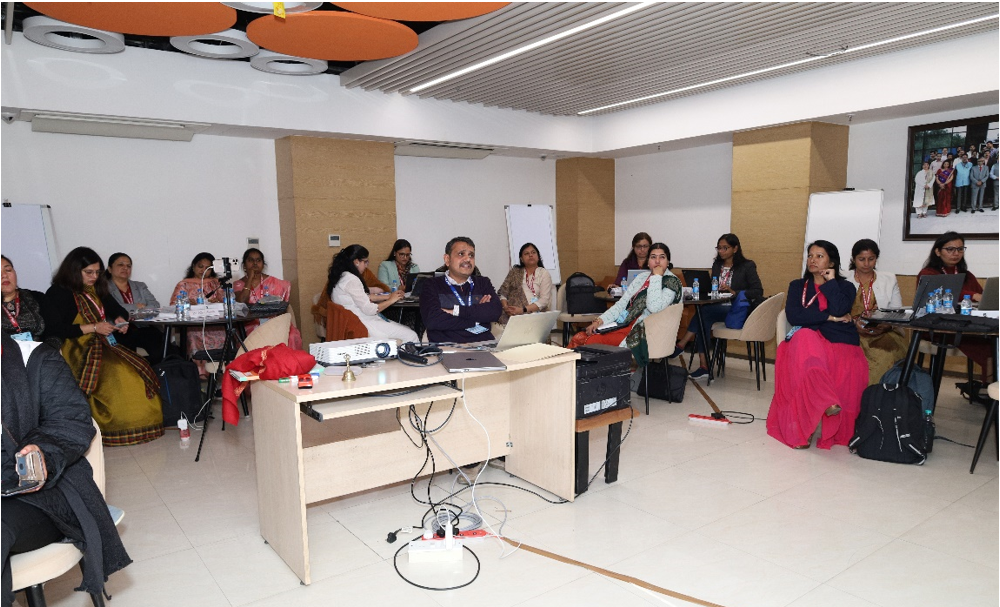 Shri Rohit Kumar, Director, Finance, DST, New Delhi, during his talk on Financial Management: Key Aspects, Tools, and Resources
Shri Rohit Kumar, Director, Finance, DST, New Delhi, during his talk on Financial Management: Key Aspects, Tools, and Resources
This was followed by a 90-minute discussion on the role of women in leadership, highlighting their contributions to space science through the Space Superstars initiative. After lunch, the session explored leadership traits (and how to acquire them), the difference between leadership and management, and the signature of a good leader, employing group and individual activities. Another networking break allowed for building peer connections. The day concluded with a reflection on intersectionality and identity: participants examined their leadership potential by evaluating their current capabilities and their aspirations. In addition, they commenced preparing their Day-4 presentations.
The candidates reviewed highlights from Day 1 that they deemed the best, in addition to previewing the Day-2 schedule. The interactive activities primarily focused on self-reflection, leadership strategies, and skill-building within leadership frameworks. The candidates discussed common qualities they admired in their WiS role models and also identified their authentic leadership style.
 Dr. Mamta Pathania, Associate Professor, Indian Institute of Public Administration (IIPA), Delhi, during her talk on Ethics, Accountability, and Governance
Dr. Mamta Pathania, Associate Professor, Indian Institute of Public Administration (IIPA), Delhi, during her talk on Ethics, Accountability, and Governance
A 40-minute talk around mid-morning by Dr. Mamta Pathania, Associate Professor, Indian Institute of Public Administration (IIPA), Delhi, touched upon ethical dilemmas and integrity threats. She began her talk by prodding the candidates to recall their earliest lessons on ethics from their childhood. Having set the stage for how we interpret ethics and morality and what its implications are in our professional lives, she went on to discuss the dilemmas we face in the workplace that put to test our decision-making. She discussed accountability in the workplace and in governance and public trust, employing a quick activity and a video clip to supplement her talk.
This was followed by a 90-minute training session on effective communication skills, including writing concisely across formats and using tools, such as a large language model (LLM)-based application. Following lunch, a 75-minute session on women’s soft power and its implications in leadership underscored the unique strengths of women leaders, outlining strategies for collaborating with male colleagues and fostering allies in the process. A networking break was followed by a 60-minute session on people and team management, focussing on technical, empathetic, inclusive, and balanced leadership. Participants also planned research themes and identified focus areas for Day-3 and Day-4 sessions.
The sessions for the day focussed on learning and demonstrating confident communication techniques and bridging gaps in their leadership skills. The candidates reflected upon their learnings from the previous day; a group activity followed that helped them appreciate the significance of diversity and inclusion in the workplace. A subsequent session delved into the candidates’ attitudes toward their careers, their families, and societal values, with a special focus on mental health and overall well-being.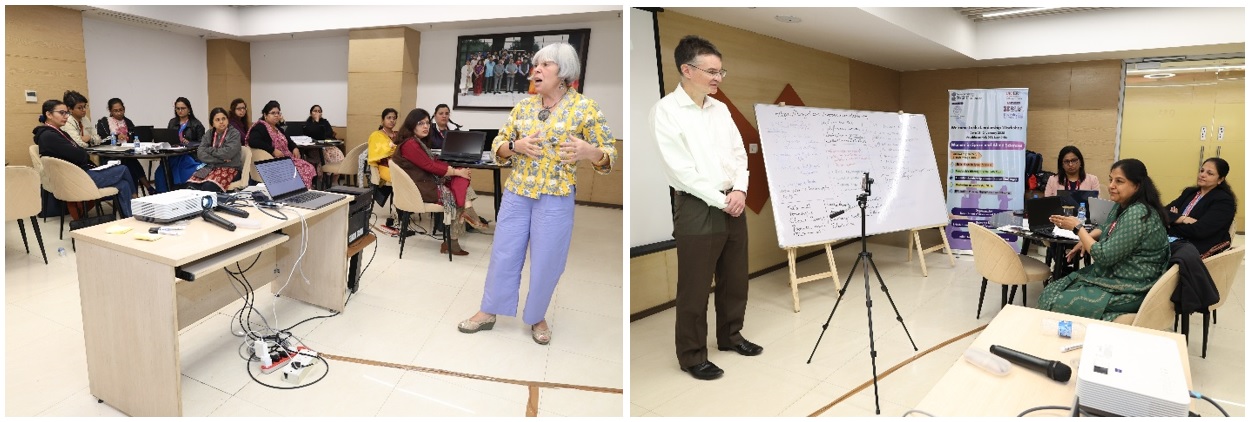 Trainers from the Coventry University, UK, Prof. Elena Gaura, Associate Pro Vice-Chancellor (Research) (Academic Engagement) and Prof. James Brusey, Professor of Computer Science, Research Centre for Computational Science and Mathematical Modelling, during their respective training sessions on Day 3
Trainers from the Coventry University, UK, Prof. Elena Gaura, Associate Pro Vice-Chancellor (Research) (Academic Engagement) and Prof. James Brusey, Professor of Computer Science, Research Centre for Computational Science and Mathematical Modelling, during their respective training sessions on Day 3
 Dr. Sachin Chowdhry, Associate Professor, Indian Institute of Public Administration (IIPA), Delhi a) during his talk on Indian policies and governance and b) with the programme candidates
Dr. Sachin Chowdhry, Associate Professor, Indian Institute of Public Administration (IIPA), Delhi a) during his talk on Indian policies and governance and b) with the programme candidates
A 40-minute talk by Dr. Sachin Chowdhry, Associate Professor, Indian Institute of Public Administration (IIPA), Delhi, provided insights into governance and policy frameworks. The speaker invoked several recent government schemes and policies to emphasise his points. He discussed the various elements of policy formulation: stakeholder consultation, evidence-based policymaking, scale and logistics, etc. A query from one the candidates that resonated with her peers was, “How can we participate in and contribute towards national policymaking?”, to which Dr Chowdhry offered tangible suggestions and solutions, encouraging the candidates to apply what they learnt in their professional and social lives.
In a 75-minute session after lunch, the candidates explored the everyday work lives of notable role models in the field of Space, through which they learnt the role of empathy in traversing diverse social and economic landscapes.
This was followed by a 60-minute session on the complementary relationship between leadership and management. The candidates learnt project management essentials, including budgeting and science administration, through guided exercises. The candidates further prepared their Day-4 presentations. The day concluded with a special session by Dr. Sanjay Mishra, Senior advisor/Scientist-H, Department of Biotechnology (DBT), Govt. of India. He delivered an insightful talk on “Adaptive Leadership: Leading Through Uncertainty” wherein he emphasized the importance of adaptability in leadership, especially in the face of uncertainty and rapid change. He highlighted key strategies for effective decision-making, resilience, and innovation in challenging environments. His talk provided valuable perspectives to the participants, equipping them with practical approaches to enhance their leadership skills in dynamic and unpredictable scenarios. Dr Sanjay Mishra, Senior advisor/Scientist-H, Department of Biotechnology (DBT), New Delhi, with the programme candidates
Dr Sanjay Mishra, Senior advisor/Scientist-H, Department of Biotechnology (DBT), New Delhi, with the programme candidates
The sessions for the day focussed on practical leadership skills, including negotiation, presentation, and influencing. The candidates recapitulated insights from the previous day. They drew future-oriented action plans as leaders and practised navigating challenges through role-playing exercises. They learnt how to manage difficult conversations, exchange feedback, and address criticism with humility, confidence, and a willingness to improve.
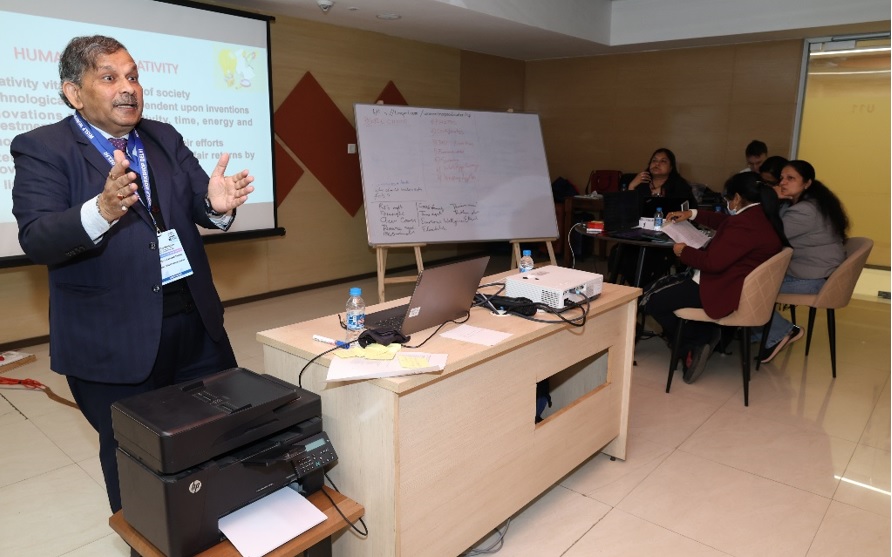 Prof. (Dr.) Avinash Kumar, Former Associate Director/Scientist G, ER&IPR, DRDO HQ, Delhi, during his talk on IPR and intellectual-assets management
Prof. (Dr.) Avinash Kumar, Former Associate Director/Scientist G, ER&IPR, DRDO HQ, Delhi, during his talk on IPR and intellectual-assets management
A 40-minute talk by Prof. (Dr.) Avinash Kumar, Former Associate Director/Scientist G, ER&IPR, DRDO HQ, Delhi, introduced the candidates to intellectual property rights (IPR) in the context of Indian higher education. The candidates learnt how to manage their intellectual assets effectively. He drew from his experiences at various organizations, describing the nuances of policy formulation and industry collaboration in the context of research and development.
The candidates delivered Three-Minute-Thesis (3MT) presentations, showcasing their ideas. Certificates for completion of the programme were distributed in addition to the People’s Choice Award for the three best 3MT presentations. An evaluation survey questionnaire was sent to the candidates by the trainers, soliciting feedback from the former.
Prof. Abhay Karandikar, Secretary, DST, interacted with the participants of the Women in Space and Allied Sciences Leadership Program (WiSLP) on January 24, 2024, during the concluding session. During his address, Prof. Karandikar emphasized the crucial role of women in science, technology, and leadership, encouraging participants to take on greater responsibilities and drive innovation in their respective fields. He highlighted various DST initiatives supporting women in STEM and underscored the importance of collaboration, mentorship, and continuous learning in shaping future leaders.
The session was highly engaging, with participants actively seeking guidance on career growth, policy-making, and research opportunities. Prof. Karandikar addressed their queries, offering valuable insights and motivation. His inspiring words left a lasting impact, reinforcing the importance of resilience, leadership, and excellence in the evolving landscape of space and allied sciences.
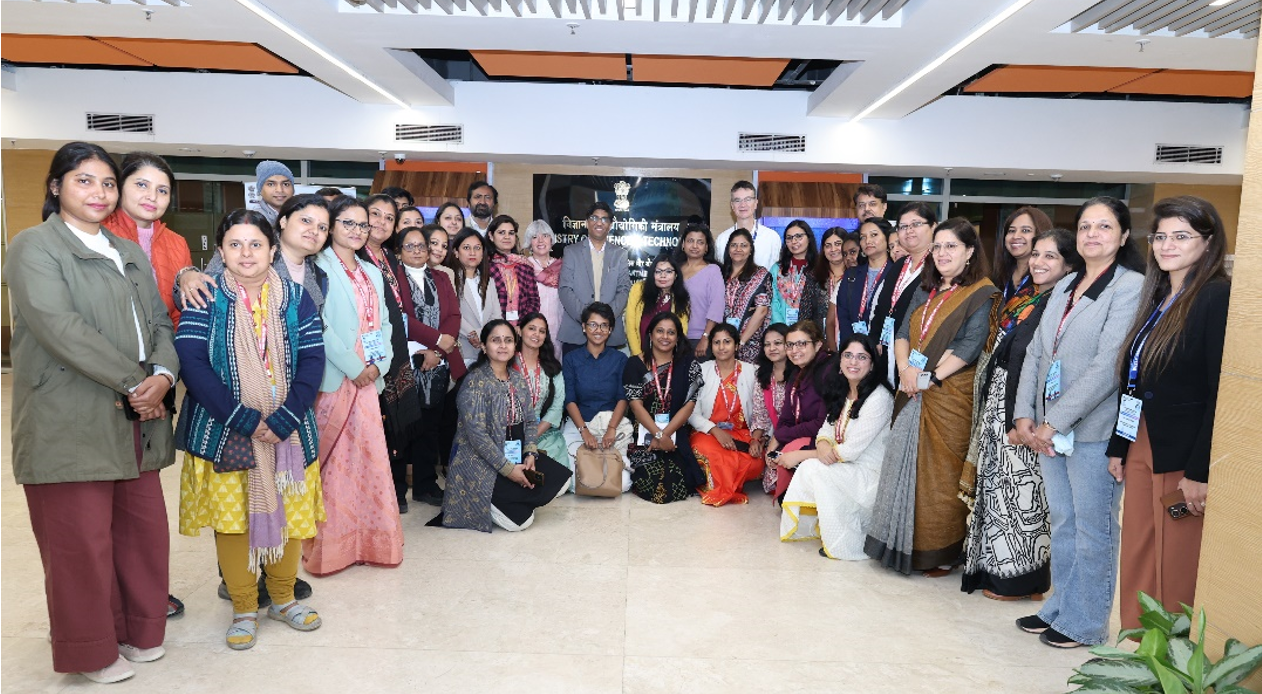 Candidates and the organizing team of WiSLP-Delhi with Prof. Abhay Karandikar, Secretary, DST, New Delhi following the closing session
Candidates and the organizing team of WiSLP-Delhi with Prof. Abhay Karandikar, Secretary, DST, New Delhi following the closing session
- Key Takeaways for Candidates
A key highlight of the programme was the informal format of discussions between the trainers and the candidates that allowed an unhindered exchange of ideas and views. Through their responses to the feedback questions, the candidates reported the following about the programme:
- The training workshop helped them learn techniques to overcome workplace obstacles as women in STEM as well as complete tasks in a short period.
- The talks were extremely relevant, especially in the context of the Indian academic and administrative scenario; they added that they are now better prepared to resolve everyday problems facing them at their institutes and universities. One of the candidates from north-eastern India noted that she feels encouraged to organize a similar leadership workshop at her university with the assistance of the DST in order to disseminate the knowledge to more researchers and educators from the north-east.
- The candidates plan to apply their learnings to “advocate for inclusivity and collaboration, mentor women and sponsor projects devised and managed by women, build diverse teams, challenge bias, strengthen networking, etc.” They intend to “implement adaptive strategies to address challenges in education and team management effectively”. As stated by one, “By shifting from a purely technical mindset to one that emphasizes leadership and influence, I can create positive change both within my team and in the wider scientific community.”
- Noting the importance of mental well-being, one of the candidates emphasised the significance of work-life integration by setting boundaries and prioritizing self-care.
- One of the candidates found the sessions to be a “perfect combination of engaging storytelling, providing both enrichment and insight…the complex topics were made accessible and inspiring” for such a diverse set of learners; “their capacity to cultivate an interactive and inclusive learning environment fostered an environment in which ideas thrived and all individuals were motivated to participate.”
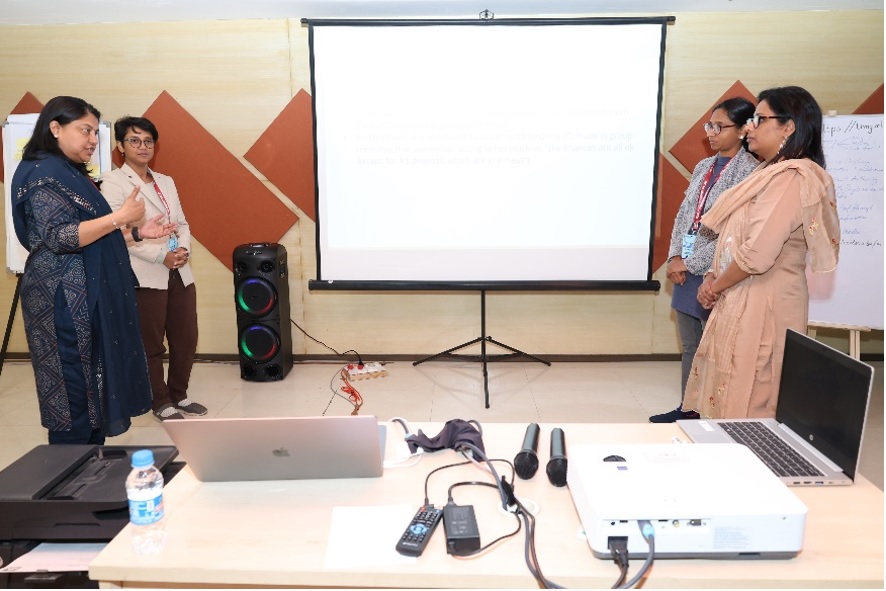 Candidates during a role-playing session
Candidates during a role-playing session
- The candidates outlined diverse plans to disseminate their learnings. Several aimed to conduct workshops and seminars at their universities, targeting scientists, and engineering professionals. Sharing workshop insights through mentorship networks, informal discussions, and focused sessions was a common theme. Some planned to integrate the acquired knowledge into existing training programs and guest lectures. Several participants emphasized creating mentorship programs, both formal and informal, to support junior faculty and students, especially women in STEM. Dissemination through publications, conference presentations, and advocacy for women in STEM were also mentioned. One participant specifically expressed interest in leading initiatives for women in Space Bioengineering, highlighting leadership development as a key takeaway.
- Key Takeaways for Organiser and Host Institutions
The INAE prepared a feedback questionnaire, which were emailed to the candidates on the 23rd of January 2025. The feedback received, with responses from 15 out of 26 candidates, was highly encouraging.
- 12 out of 15 respondents rated their overall experience as “excellent”. The rest rated it as “good”.
- 8 out of 15 respondents found the workshop content “highly relevant”, with the remaining 6 finding the content “moderately relevant”
- 14 respondents found the workshop to be well-structured in terms of sessions, activities, breaks, etc., and 1 found it to be partially well-structured.
- The knowledge and communication skills of the facilitators and speakers were rated as “excellent” by 14 and “good” by 1 out of 15 respondents.
- Average rating (out of 5) by the respondents for
- quality of topics covered: 4.5
- relevance of leadership skills discussed: 4.7
- clarity of presentations: 4.4
- effectiveness of group discussions: 4.7
- engagement and interactivity: 4.8
The candidates offered diverse feedback for improving future workshops. A key suggestion was incorporating more interactive elements such as simulations as well as more tailored case studies relevant to participants’ specific career challenges. Several candidates requested more technical content, including lectures on recent research and technologies. They also suggested expanding the diversity of speakers and facilitators to include individuals from varied backgrounds, industries, and experiences. Curriculum enhancements were also proposed. The candidates suggested allocating more time for discussions with speakers and for addressing participant questions and advocated for post-workshop mentorship programs to provide continued support and guidance. Some suggested incorporating allyship training for male colleagues and implementing long-term mentorship networks to foster continuous growth.
Candidates reported satisfaction with the venue, facilities, and arrangements; all respondents agreed that the workshop was conducted in a supportive and inclusive environment. Some candidates requested earlier notification for registration to facilitate travel arrangements, as well as increased travel support. A few candidates suggested a more detailed and organized program schedule to better manage time and engagement. The candidates reiterated that they look forward to participating in more such workshops in the future, recommending that this programme be conducted across the country to benefit women researchers, educators, and administrators, not just in the field of space and allied sciences but also in other STEM fields.
- India-Taiwan Programme of Cooperation in Science & Technology
International Cooperation Division (ICD), DST entrusted INAE to implement India-Taiwan joint program from 2023 onwards. This cooperation is being coordinated by National Science and Technology Council (NSTC) from Taiwan’s side. It is a joint program of cooperation between India and Taiwan and a joint call for proposal is launched every year. In this regard, a MoU was signed between INAE and ICD, DST on May 15, 2023 in presence of the Secretary, DST, and the President, INAE wherein it was discussed to launch a call for proposal (CFP) for the projects every year. A total of 11 projects for call for proposal 2022, and 15 projects for call for proposal 2023 were approved for a period of three years.
The call for proposal 2024 was launched during June 2024 to July 2024. The priority areas for R&D projects are Artificial Intelligence, IoT (Internet of Things), Big Data, Cyber Security; Biotechnology, Healthcare including Functional Genomics, Drug Development and Biomedical Devices; Agriculture and Food Sciences; Green Energy Technology/ Renewable Energy (solar energy and bioenergy)/ Clean Energy; Semiconductor & Communication; Aerospace Technology and Manufacturing Technologies. A total of 165 eligible bilateral proposals were received which were evaluated by the members of the Project Evaluation Committee constituted for the purpose and a total of 15 bilateral proposals are approved mutually by India and Taiwan for a period of three years to be commenced from January 2025.
- Vaishvik Bharatiya Vaigyanik (VAIBHAV) Fellowship
This initiative is pursuant to Government of India VAIBHAV Summit organized in October 2020 to connect Indian STEMM diaspora with Indian Institutions. In this connection, the Government has taken a step further to shape and implement the VAIBHAV programme and announced VAIBHAV Fellowship Call-2023 in June 2023 as a first step and the results were announced on 23 Jan 2024. DST has assigned INAE to administer and implement VAIBHAV Fellowship. The Sanction order for the fellowship was received on September 17, 2024 from DST and the release of grant has been disbursed to all eligible VAIBHAV and Distinguished VAIBHAV fellows selected under the first call. So far 22 VAIBHAV fellows and 02 Distinguished VAIBHAV fellows have been selected under first call. The visit by VAIBHAV fellows has since been progressed and post visit reports submitted to DST.
- DST-Women International Grant Support (WINGS) program
DST has entrusted INAE to undertake the implementation of WINGS program, which aimed to provide opportunities to Indian Women Scientists, Engineers & Technologists to undertake international-level research experience in advanced research labs of relevant institutions of the world, to enhance their scientific research capacities. The program includes three modules (i) Module I: WINGS Internship (up to 12 months), (ii) Module II: WINGS Fellowship (up to 12 months), and (iii) Module III: Wings Science visit (up to one month). Recently, a workshop for Women Scientists working in Space and Allied Sciences (WiSLP) in collaboration with the British Council under the UKEIRI programme was organised at Delhi and between 22-25 January, 2025 at the Aryabhatta Hall, Department of Science and Technology (DST), New Delhi, India. The programme was organised by the DST and the UK-India Education and Research Initiative (UKIERI), India, delivered by the British Council, India and the Coventry University, UK, and hosted by the DST and the Indian National Academy of Engineering (INAE). The initiative focused on supporting institutions and women scientists in fostering and strengthening women’s leadership. The Workshop incorporated various activities that gauged and honed the communication, decision-making, and technical skills of the candidates, especially skills relevant to the areas of leadership, administration, and financial management.
International Affairs
CAETS Engineering Education Working Group
International Council of Academies of Engineering and Technological Sciences CAETS is an independent non-political, non-governmental, international organization of engineering and technological sciences academies, one-member Academy per country. INAE being the only engineering academy of the country represents India at CAETS. One of the activities of CAETS, chaired by the President, INAE, is the CAETS Engineering Education Working Group (EEWG). The meetings of this working group are held quarterly. The objective of EEWG is to contribute to continuous improvement and modernization of engineering education and practice internationally and bring out a report on the subject. A recent meeting of CAETS EEWG was held on November 22, 2024 wherein the following two topics were discussed giving country wise perception – (i) Intellectual Property Rights (IPR), and (ii) Accreditation of engineering degree courses.
Election of Fellows and Foreign Fellows
Nominations for Fellowship and Foreign Fellowship have been invited in January 2025 with last date of March 31, 2025. As a part of the on-going initiative of INAE to digitize as much of its operation as possible, kindly note that from the year 2020 onwards, nominations for election to the Fellowship of INAE are to be submitted online through a Digital Platform (using personal log-in credentials of the Fellows registered with INAE). However, as this is the fifth year of transition in exceptional circumstances, nominations can also be submitted as soft copy forwarded through email, if not feasible for submission through Digital Platform. Details regarding eligibility criteria, nomination process, nomination forms and other important issues have been uploaded on INAE website and are available at the link https://www.inae.in/forms/
INAE Young Associate
Nominations have been invited for INAE Young Associate 2025 with last date of March 31, 2025. The sponsor must be either a Fellow of INAE or Head of the organization/ institution/HoD/Dean where the nominee is working. The recognition of “INAE Young Associate” is being given by INAE as per guidelines, to recognize outstanding achievements/contributions made by Young Engineers with strong potential for future professional growth impact in any branch of engineering. The objective of the recognition is to identify, recognize and encourage young and promising talents in India who have made and are likely to continue to make outstanding contributions impacting engineering research and design, technology development and transfer. The criteria entails evidence of excellence in engineering research, product/process, design, technology development and transfer. Specific contribution submitted for consideration of the recognition which should have been carried out in India. Any citizen of India not older than 35 years holding the first tertiary degree in engineering/technology as on 1st of January each year is eligible for consideration. However, lady nominees are eligible for age relaxation of five years for consideration. Upto 30 INAE Young Associates shall be selected each year. A Certificate as INAE Young Associate shall be given to the selected nominees, however there is no cash prize. All INAE Young Associates on selection and shall continue to be so till attaining 45 years of age. Further details and application proforma can be downloaded from INAE website at the link https://www.inae.in/young-criteria/
INAE Publications
Transactions of Indian National Academy of Engineering – An International Journal of Engineering and Technology”
INAE is currently publishing a Journal named “Transactions of Indian National Academy of Engineering – International Journal of Engineering and Technology” published by M/s Springer which was earlier named INAE Letters. Transactions of INAE Volume 9, Issue 4, December 2024 was published through Springer Publishers during the period October 2024 to January 2025.
Donations to INAE Corpus Fund
INAE had faced an unexpected development because of the decision of the Government conveyed through the Department of Science and Technology that the funding of INAE would cease from April 1, 2025 onwards. Therefore, a lot of measures had to be taken to counter the situation and the Governing Council took the decision that INAE should raise its own corpus so as to become not only functionally but financially autonomous. A target to achieve about Rs 100 Crores was set so that the annual interest of Rs 5-6 Crores could meet the operational cost of the Academy. Since then, good progress has been made and substantial commitment and contributions have been received, which shall ensure the continuance of the Academy and that INAE would not only survive but thrive.
INAE had worked out a strategy to generate a Corpus Fund of Rs 100 crores to ensure its sustainability with financial and functional autonomy seeking contributions from (i) Corporate Donations/Membership; (ii) Institutional Membership (Academic and R&D institutions); (iii) Individual Donations/Membership; (iv) Corporate Social Responsibility (CSR); (v) Government/ Projects; and (vi) Publications. Positive response has been received regarding Corporate Donations and Members and Institutional Members and it is also aimed to reach a figure of ten thousand Individual Members over the years. Many of our esteemed Fellows have already contributed to this cause, voluntarily and with alacrity. INAE gratefully acknowledges their contributions to bolster our collective efforts and resolution. However, though a beginning has been made, the number need to be enhanced with active support from the Fellowship and engineering community at large and increase in outreach and visibility of INAE. The details for forwarding of donations and tax benefits to donors are given below:
Bank Details for receipt of donation to INAE:
Name of beneficiary: INAE Corpus Fund
Account Number: 41790835603
Bank Address: Jawaharlal Nehru University, New Mehrauli Road, New Delhi
Type of Account: Savings
IFSC: SBIN0001624
Tax benefits for donors
The contribution to the INAE Corpus Fund qualifies to be considered under the category of donation and is eligible for 50% tax deduction under section 80G under the old tax regime. The donors will get a receipt and the 80G certificate within a fortnight.
INAE is extremely grateful to all Fellows who have generously contributed to the INAE Corpus Fund and welcomes further contributions/donations from Fellows, Young Associates, Awardees; Industry Leaders and Industry Houses etc with a view to achieving self-sufficiency in functioning in the near future. A donor wall containing names of Fellows who have generously donated is posted on INAE website at the link https://www.inae.in/donor-wall/
Categories of Memberships Introduced in INAE
INAE Membership was introduced to embrace a wider reach and participation of engineering community, which shall be accorded to working professionals in engineering in the industry, R&D or academic institutions, engineering services, entrepreneurship firms, and government/private agencies. After a duly approved process, Individual Membership will be awarded to aspiring mid-career to senior engineering professionals, to give them a fillip for their future professional journeys who still have milestones to achieve in their career path, before they attain the gold standards to be elected as Fellows of INAE. Individual Membership entails a yearly fee and is as per timelines. The Fellowship retains the premier Gold Standard and the Membership category is independent and by no means affects the prestige of the Fellowship category. An appeal has been made to all Fellows to support these initiatives and help facilitate a greater number of Memberships in all three categories – Institutional, Corporate and Individual Memberships. INAE Fellows have been requested to help facilitate forwarding of nominations for Memberships in all three categories – Institutional, Corporate and Individual Memberships.
Infosys Foundation and INAE Collaborate to Transform Engineering Education in India
Infosys Foundation, the philanthropic and CSR arm of Infosys, has signed a four-year MoU with the Indian National Academy of Engineering (INAE) to enhance and transform engineering education in India on Dec 16, 2024. The Press Release regarding this news was announced during the INAE Annual Convention 2024 on Dec 21, 2024 at New Delhi. For further details, please click on the link given below:
Important Meetings held during October 2024 to January 2025
October 2024
i. Meeting of INAE Forum on Civil Infrastructure held on October 1, 2024 over WebEx.
ii. Meeting of Sectional Committee –VII (Aerospace Engineering) regarding preparation of Technology Roadmap Reports held on October 8, 2024 over WebEx.
iii. Meeting for evaluation of Individual Membership Applications Cycle-2 held on October 8, 2024 over WebEx
iv. Meeting of INAE Forum on Civil Infrastructure held on October 15, 2024 over WebEx.
v. CAETS Communications Committee quarterly meeting held on October 17, 2024 over WebEx.
vi. Meeting of INAE Forum on Civil Infrastructure held on October 18, 2024 over WebEx.
November 2024
i. Review Meeting of Digital Gaming Research Initiative held on November 5, 2024 over WebEx.
ii. Meeting of Conveners of Sectional Committees with President, INAE held on November 5, 2024 over WebEx.
iii. Meeting of Sectional Committee VIII (Mining, Metallurgical and Materials Engineering) to discuss INAE Reports on “Technology Review / Forecasting / Gap Analysis held on November 7, 2024 over WebEx.
iv. 50th Apex Committee Meeting held on November 9, 2024 over WebEx.
v. Online Meetings of PEC domain experts held on November 13-14, 2024 and November 19-21, 2024 over WebEx
vi. CAETS Engineering Education Working Group Meeting held on November 22, 2024 over WebEx.
vii. Meeting of Sectional Committee Conveners with President, INAE to review progress on Technology Roadmap Articles on November 25, 2024 over WebEx.
December 2024
i. Meeting of INAE Forum on Civil Infrastructure held on December 2, 2024 over WebEx.
ii. 42nd Finance Committee Meeting of INAE held on December 6, 2024 in hybrid mode.
iii. 153rd Governing Council meeting held on December 19, 2024 at IIT Delhi in hybrid mode.
iv. 36th AGM of Fellows (Part-B) and SGM of Fellows (2024) held on December 21, 2024 at IIT Delhi in hybrid mode.
v. Meeting of INAE Forum on Civil Infrastructure held on December 30, 2024 over WebEx.
January 2025
i. 52nd Apex Committee Meeting of INAE held on January 14, 2025 at INAE Office, New Delhi in hybrid mode.
ii. Meeting of INAE Forum on Civil Infrastructure held on January 17, 31, 2025 over WebEx.
iii. Meeting of Scouting Committee to identify nominees from Industry for election as Fellows held on January 31, 2025 over WebEx.
International/National Conferences/Seminars being organized by IITs/other Institutions
To view a list of International/ National Conferences/Seminars being held in the month of February/ March 2025, click here….
Padma Awards
- Pawan Kumar Goenka, FNAE, Chairman, IN-SPACe, Department of Space, Government of India has been conferred with the prestigious “Padma Shri” Award in the field of “Trade and Industry” by President of India on Republic Day January 26, 2025.
- Prof Ashutosh Sharma, FNAE, Institute Chair Professor, Department of Chemical Engineering, IIT Kanpur has been conferred with the prestigious “Padma Shri” Award in the field of “Science and Engineering” by President of India on Republic Day January 26, 2025.
Honours and Awards (covering the period October 2024 to January 2025)
| 1 | Prof. M.R. Madhav, FNAE, Professor Emeritus, JNT University; Visiting Professor, IIT, Hyderabad was selected as a recipient of the first ISSMGE Asian Lifetime Service Awards which is a testament to his remarkable contributions and achievements in the field. The award will be given during the 1st Geotech Asia 2025 to be held in Goa. |
| 2 | Dr Vallam Sundar, FNAE, Advisory Consultant and formerly Professor Emeritus, Department of Ocean Engineering, Indian Institute of Technology Madras, Chennai was presented the Hamaguchi Award in recognition of his outstanding achievement and contribution to tsunami /Coastal Disaster Resilience technology on the occasion of World Tsunami Awareness Day (November 5) presented by the Minister of Land, Infrastructure, Transport & Tourism, Japan, on October 30, 2024. |
| 3 | Prof Mahesh Tandon, FNAE, Chairman of Tandon Consultants Pvt Ltd has been conferred with the Lifetime Achievement Award of Consulting Engineers Association of India on January 10, 2025 in recognition of his innovative, aesthetic and environmentally sensitive designs in projects acclaimed both in India and internationally. |
| 4 | Mr S Somanath, FNAE, former Chairman, ISRO received the International Astronautical Federation’s (IAF) prestigious World Space Award for Chandrayaan-3’s remarkable achievement during a ceremony, in Milan, Italy in October 2024 to celebrate India’s contributions to space exploration. |
News of Fellows (covering the period October 2024 to January 2025)
| 1 | Dr. V Narayanan, FNAE, Director and Outstanding Scientist, Liquid Propulsion Systems Centre, ISRO, Thiruvananthapuram assumed the office of the Secretary, Department of Space (Government of India) and Chairman, Space Commission beginning 14th January 2025. With nearly four decades of experience in the Indian space sector, he has held several pivotal positions within the organization, specializing in rocket and spacecraft propulsion. Among his notable achievements, Dr. Narayanan served as the Project Director for the C25 Cryogenic Project of the GSLV Mk III vehicle. Under his leadership, the team successfully developed the C25 Stage, a crucial component of the GSLV Mk III. |
| 2 | Prof GD Yadav, FNAE, National Science Chair, Govt. of India and Emeritus Professor of Eminence, ICT and JC Bose National Fellow, Institute of Chemical Technology, Mumbai, Former Vice Chancellor & R.T. Mody Distinguished Professor, Institute of Chemical Technology; Former Tata Chemicals Darbari Seth Distinguished Professor of Leadership and Innovation; Conjoint Professor, University of New Castle, Australia; Adjunct Professor, RMIT University, Australia and Adjunct Professor, University of Saskatchewan, Canada has been approved for the conferment of the award of CSIR Bhatnagar Fellowship for the year 2024 by the Council of Scientific and Industrial Research (CSIR) in recognition of his outstanding work in science and technology. |
| 3 | Prof. Dr. S.N. Mukhopadhyay, FNAE, Former Professor, DBEB, IIT Delhi; Former Professor & Head, BERC, IIT Delhi with wife Mrs Sakuntala have jointly written their biopic book Anande Jeebansrote in Bangla medium printed by SR Print studio associated with KMS, C.R. Park, New Delhi where he is a life member. They also jointly contributed the article “Our Goa Visits” in Souvenir Durga Puja 2024 which has been printed by KMS, C.R.Park, New Delhi in January 2025 |
| 4 | Dr. Raksh Vir Jasra, FNAE, Senior Vice-President (R&D), R&D Centre, Vadodara Manufacturing Division, Reliance Industries Limited, Vadodara, Gujarat has been listed at number 34 in top 50 inventers of India published by Insights GREYB. For details click on links below.
https://insights.greyb.com/top-50-indian-inventors-leading-the-patent-filing-in-india/ |
| 5 | Dr. S. Venkata Mohan, FNAE, Chief Scientist at the CSIR-Indian Institute of Chemical Technology (CSIR-IICT), Hyderabad took over as Director of the CSIR-National Environmental Engineering Research Institute (CSIR-NEERI) on January 30, 2025. |
| 6 | Prof Subhasis Chaudhuri, FNAE, Former Director, Indian Institute of Technology Bombay, Mumbai- has been appointed as Chairman of the Board of Directors of BSE Limited. |
| 7 | Dr. Jaiteerth R Joshi, FNAE, Outstanding Scientist & Former Programme Director, Programme LRSAM, Defence R&D Laboratory, Hyderabad has assumed charge as Director-General of BrahMos, DRDO and CEO & Managing Director, BrahMos Aerospace from Dec 1, 2024. |
INAE on Facebook and Twitter
INAE has created a Facebook and Twitter Account to post the news of recent INAE activities in the Social Media. The same can be viewed at the link below.
(a) Facebook -link https://www.facebook.com/pages/Indian-National-Academy-of-Engineering/714509531987607?ref=hl
(b) Twitter handle link https://twitter.com/inaehq1
INAE Staff
INAE has a lean team of staff functioning at INAE Headquarters located in Technology Bhavan, DST Complex, New Delhi and a recent group photograph is given below.
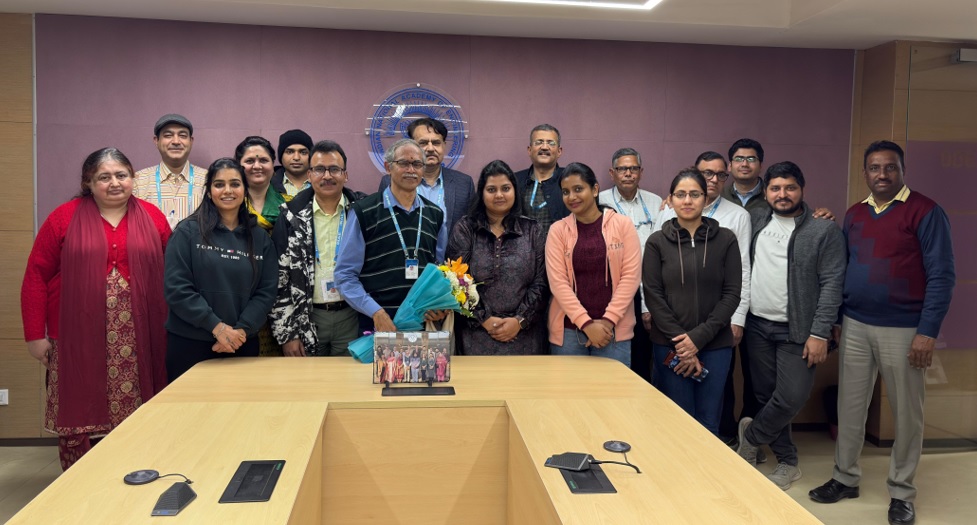
Obituaries
Shri Ratan Tata
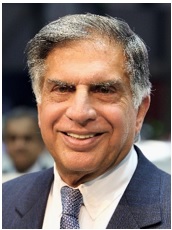
(28 December 1937 – 9 October 2024)
Shri Ratan Tata, FNAE born on 28 December 1937 passed away on 9 October 2024. He was elected to INAE Fellowship in the year 1992 and affiliated to Engineering Section X (Interdisciplinary and Special Engineering Fields and Leadership in Academia, R&D and Industry).
Shri Ratan Tata, Chairman Emeritus, Tata Industries Ltd, Mumbai; former Chairman, Tata Sons was a doyen of Indian Industry who took the reins of the Tata Group in 1991 and over his two-decade-long leadership, he oversaw the diversification and expansion of the group into sectors such as IT, steel, automobiles, and hospitality. Mr Tata had serves as the chairman of major Tata companies, including Tata Motors, Tata Steel, Tata Consultancy Services, Tata Power, Tata Global Beverages, Tata Chemicals, Indian Hotels and Tata Teleservices and took them to greater heights of excellence. The introduction of the Tata Nano in 2008, aimed at providing affordable cars for the masses, stands out as one of his important accomplishments. Under his guidance, the Tata Group also made key global acquisitions, including Tetley, Jaguar Land Rover, and Corus. Tata also championed startups and entrepreneurship, investing in young innovators and fostering a spirit of innovation in India through ventures like Tata Capital and Tata Start-up Hub.
Shri Tata was conferred the INAE Life Time Contribution Award in Engineering in the year 2008 for his outstanding contributions to the growth of the Indian Industry and for being a visionary business leader, par excellence. He was also inducted as a Member of the National Academy of Engineering, USA in recognition of his outstanding contributions to industrial development in India and across the world. He was honored with the Padma Bhushan in 2000 and the Padma Vibhushan in 2004 by the Hon’ble President of India for his contributions to Indian industry.
Shri Tata was recognized not only for his outstanding contributions to Indian Industry, corporate sector and engineering community but for his grace, eminence and philanthropy. He leaves behind a profound legacy of business leadership, global expansion, and a deep commitment to societal betterment, having donated generously to charitable causes. He was a supporter of education, medicine and rural development and recognized for his deep commitment as a philanthropist. In his demise, the country and the engineering fraternity have lost one of the greatest icons and inspiration for excellence.
May God bless her soul to Rest in Peace
Dr R Chidambaram
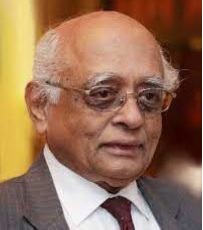
(November 11, 1936 – January 4, 2025)
Dr R Chidambaram, FNAE born on November 11, 1936 passed away on January 4, 2025. He was elected to INAE Fellowship in the year 1998 and affiliated to Engineering Section IX (Energy Engineering).
Dr R Chidambaram, FNAE, Chairman (Honorary), School for Advanced Studies in Nuclear Science & Technology, Bhabha Atomic Research Centre (BARC), Mumbai and Formerly Director, BARC; Formerly Chairman, Atomic Energy Commission and Secretary, Department of Atomic Energy and Formerly Principal Scientific Adviser to the Govt. of India & DAE Homi Bhabha Professor, Bhabha Atomic Research Centre, Mumbai was an eminent physicist who is known for his integral role in India’s nuclear weapons program. He was a part of the team conducting the first Indian nuclear test (Smiling Buddha) at Pokhran Test Range in 1974. He also led and represented the team of the Department of Atomic Energy (DAE) while observing and leading efforts to conduct the second nuclear tests in May 1998.
Some of Dr Chidambaram’s initiatives as Principal Scientific Adviser to the Govt. of India including the setting up of the Core Advisory Group for R&D in the Automotive Sector (CAR) to increase academia-industry interaction, the creation of RuTAGs (Rural Technology Action Groups) for effective need based technology delivery in rural areas and the establishment of SETS (Society for Electronic Transactions and Security) are making significant impact. He jointly with the National Informatics Center helped conceptualise and supervise the setting up of the high-speed ‘National Knowledge Network’ to connect about 1,500 educational and research institutions in India. He also had emphasized the need for ‘Coherent Synergy’ (a phrase he had coined) in India’s Science & Technology (S&T) efforts to take India on a sustained fast-growth path. He had also focused on the importance of ‘Directed Basic Research’ as an addition to self-directed basic research. As Chair of the Scientific Advisory Committee to the Cabinet, he championed advancements in energy security, materials science, supercomputing, and nanotechnology. Dr Chidambaram was conferred with several distinguished awards and honours including the Padma Shri in 1975 and the Padma Vibushan in 1999 by President of India. He was conferred the INAE Life Time Contribution Award in Engineering during the year 2009.
May God bless his soul to Rest in Peace
Prof R Subbayyan
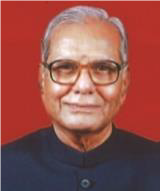
(June 08, 1925- May 2, 2023)
Prof R Subbayyan, FNAE, Former Vice-Chancellor, Bharathiar University, Coimbatore, born on June 08, 1925 passed away on May 2, 2023. He was affiliated to Engineering Section – V (Electrical Engineering) and elected to INAE Fellowship in the year 2013.
Prof R Subbayyan had made significant research contributions in the areas of Electric Machines & Power Systems and Systems Engineering. He was the first Vice- Chancellor of Bharathiar University and served from 1982 to 1988. An Emeritus Professor of University Grants Commission from 1988 to 1990, he was an executive committee member of AICTE from 1994 to 1997. He contributed significantly to the development of PSG College of Technology, Coimbatore and served as Member of several educational committees, and also was on the board of numerous institutions. He was an advisor and consultant for joint projects with industry. He published more than 50 research papers in national and international technical journals, seminars and conferences proceedings. He was the education consultant for Asian Development Bank and Chairman of Assessment Committee and Consultant for Defence Research and Development Laboratories.
May God bless his soul to Rest in Peace
Prof. Subhash Mahajan
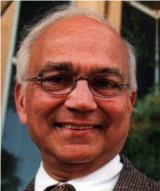
(October 04, 1939- August 17, 2023)
Prof Subhash Mahajan, FNAE, Distinguished Professor and Special Adviser to the Chancellor, University of California, USA born on October 04, 1939 passed away on August 17, 2023. He was affiliated to Engineering Section – VIII (Mining, Metallurgical and Materials Engineering) and elected to INAE Foreign Fellowship in the year 2014.
Prof Subhash Mahajan had made significant research contributions in the areas of Functional Materials and Deformation behaviour of solids. His research focused on understanding the origins of defects in semiconductors and their influence on device behaviour and deformation behaviour of solids. He joined Bell Laboratories in 1971 and served for 12 years, working on twinning and perfecting silicone for crystals for the rapidly advancing electronics technology. He then joined as Professor of Materials Science at Carnegie-Mellon University in Pittsburgh and later joined Arizona State University, USA, where he served Regents and Emeritus Professor and was former director of the School of Materials Engineering before joining University of California. He was a member of several professional societies, received several awards, and mentored generations of material scientists. He was a dedicated educationist and researcher in the area of Materials Engineering.
May God bless his soul to Rest in Peace
Prof. AP Kudchadker
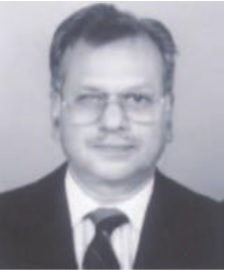
(February 16, 1934 – August 13, 2024)
Prof. AP Kudchadker, FNAE, Professor Emeritus, Indian Institute of Technology Bombay, Mumbai born on February 16, 1934 passed away on August 13, 2024. He was affiliated to Engineering Section – IV (Chemical Engineering) and elected to INAE Fellowship in the year 1994.
Prof. AP Kudchadker had made significant research contributions in the area of Process Engineering. He was a faculty of Chemical Engineering at IIT Kanpur, prior to joining IIT Bombay and after retirement was founding Director of Dhirubhai Ambani Institute of Information and Communication Technology and Pandit Deendayal Upadhyay Petroleum University in Gujarat. He made outstanding contributions to the growth of engineering education, research and academic administration. He was a mentor to several generations of students and served as Deputy Director at IIT Bombay from 1986-1994. He worked in the area of Thermodynamics, and developed a laboratory in thermodynamics research at IIT Bombay. He was among the first to recognize the importance of sustainable chemical processing, and initiated programs with a broad vision for shifting the focus to bio-based raw materials from fossil-based ones.
May God bless his soul to Rest in Peace











